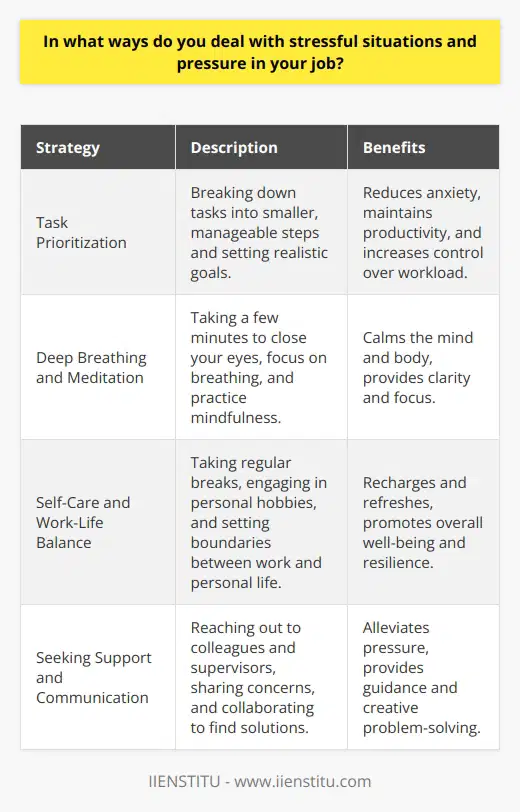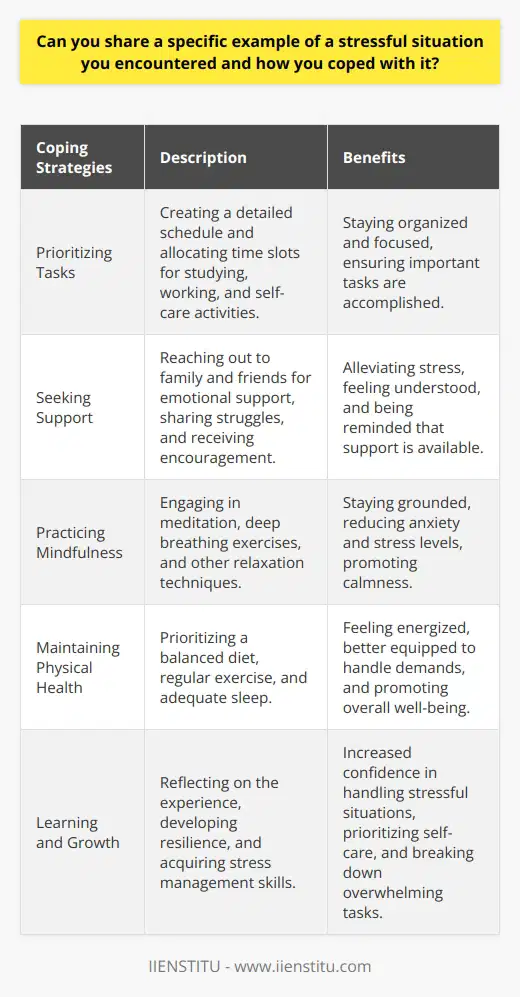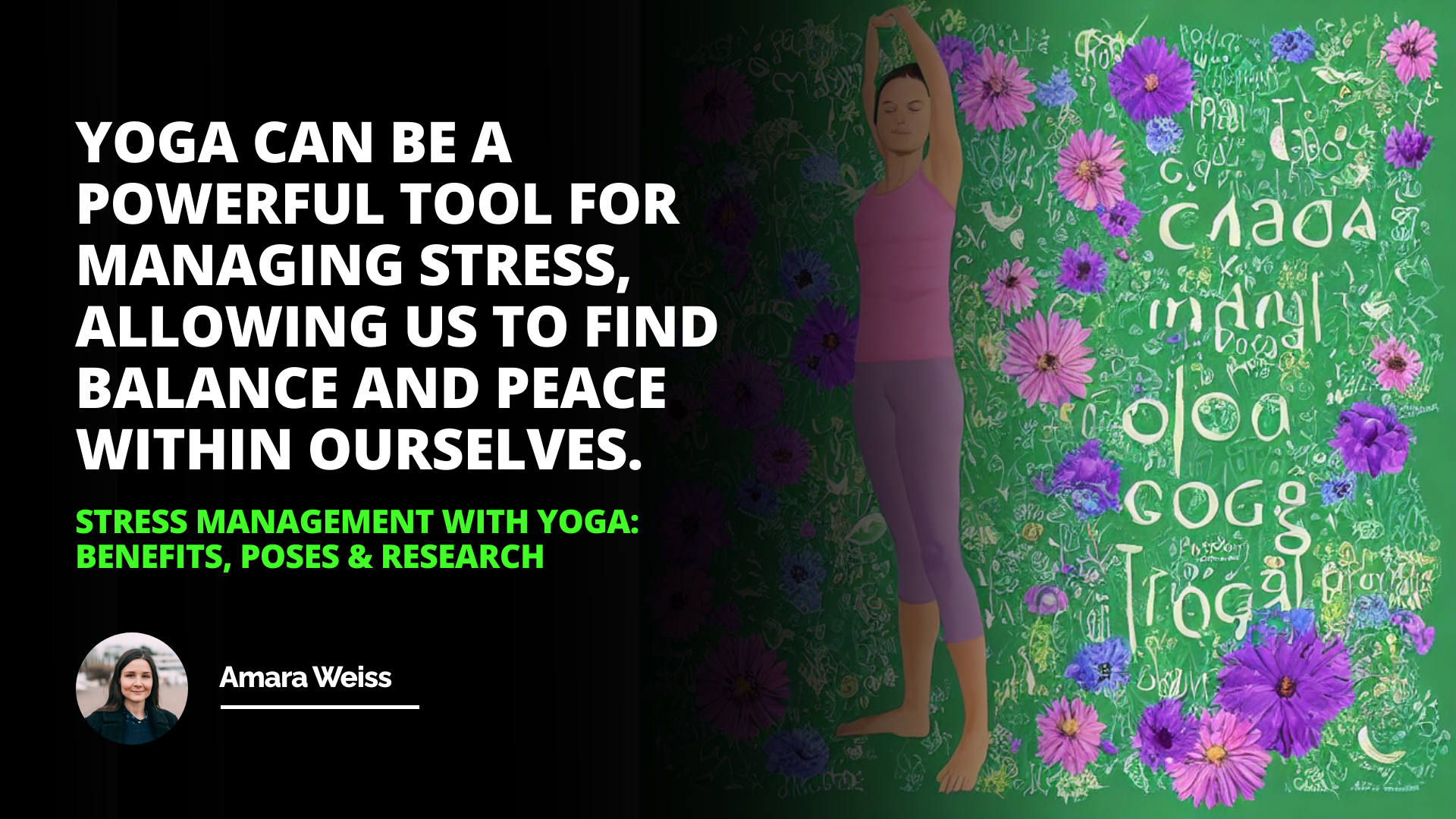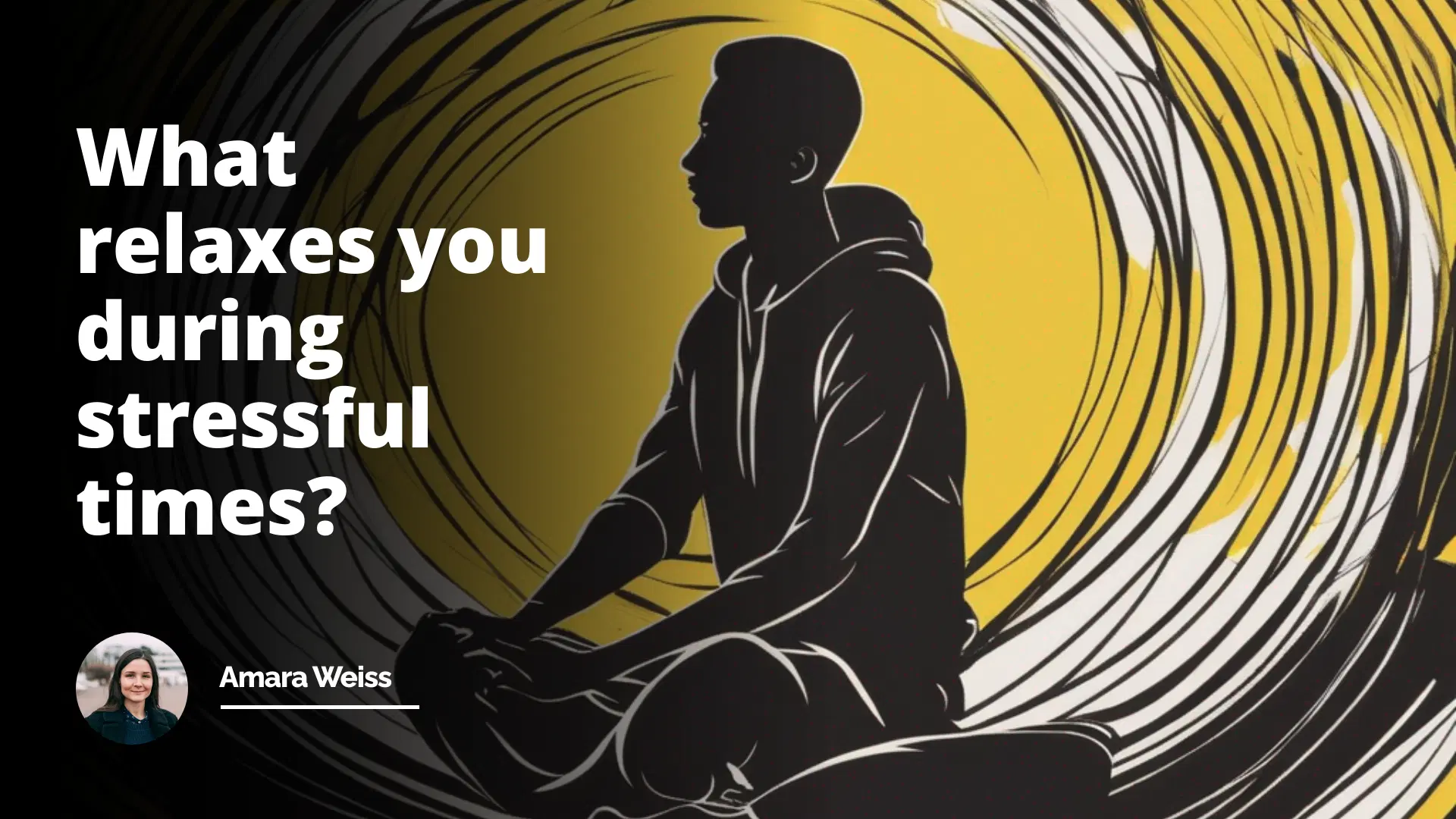
In today's fast-paced world, stress has become an integral part of our lives. Whether it's work pressure, personal relationships, or financial worries, stress affects us all. During such overwhelming times, it becomes crucial to find ways to relax and unwind. Employers understand the importance of hiring individuals who can manage stress effectively, making it a popular question in job interviews. In this article, we will explore why this interview question is asked, the purpose behind it, which interview level it is usually asked at, what kind of answer is expected from candidates, and possible answers to consider.
Why is this interview question asked: What Relaxes You During Stressful Times?
Employers want to gauge how well candidates handle stress and what strategies they employ to relax during challenging times. This question helps them assess the emotional intelligence, self-awareness, and problem-solving skills of the candidate.
By asking about relaxation techniques, employers can determine if the candidate is capable of maintaining a healthy work-life balance and whether they possess effective coping mechanisms.
The purpose of the question:
The main purpose of this question is to understand how candidates manage stress and if they have developed positive habits to deal with challenging situations.
Employers want to hire individuals who can thrive in high-pressure environments and contribute to the overall well-being of the team. By asking this question, interviewers aim to gather insights into the candidate's resilience, self-care habits, and their ability to maintain productivity during stressful periods.
At what interview level is it asked?
This question can be asked at various interview levels, depending on the nature of the job and the importance of stress management within the role. It is particularly common for mid to senior-level positions that require leadership, decision-making, and adaptability skills.
Interview Question: How Do You Balance Urgency vs. Importance in Time Management?
Interview Question: Have you successfully adapted to a major change?
Interview Question: How Do SEO and Digital Marketing Intersect?
Related Course: Online Leadership Course
Related Course: Free Online Stress Management Course
Stress management is crucial for individuals in managerial roles as they need to navigate challenges while maintaining team morale. However, candidates at any level can be asked this question to assess their overall well-being and stress management skills.
What kind of answer is expected from the candidate?
Employers expect candidates to provide authentic and genuinely effective ways they relax during stressful times. They are looking for answers that demonstrate self-awareness, healthy coping mechanisms, and a proactive approach towards stress management.
Candidates should avoid generic or cliché responses and instead provide specific examples of techniques they implement to unwind. Interviewers are often interested in hearing about activities that show a work-life balance, such as hobbies, exercise, or mindfulness practices.
Possible answers to consider:
When answering this question, candidates should focus on techniques that are not only effective but also practical and achievable. Here are some possible answers to consider:
Exercise and physical activity: Engaging in regular exercise releases endorphins, improves mood, and provides a healthy outlet for stress. Candidates can mention activities they enjoy, such as yoga, running, or swimming, and explain how it helps them relax.
Mindfulness and meditation: Practicing mindfulness and meditation techniques can help individuals stay present, reduce anxiety, and increase focus. Candidates can describe how they incorporate mindfulness into their daily routine, whether it's through guided meditation apps or mindful breathing exercises.
Creative or artistic outlets: Engaging in creative activities like painting, playing a musical instrument, or writing can be highly therapeutic. Candidates can discuss how they find solace in their hobbies and how they use these activities to unwind and channel their emotions.
Spending time in nature: Being surrounded by nature has a calming effect on the mind and body. Candidates can share experiences of going for walks, spending time at the beach, or taking hikes in the mountains to find peace and relaxation.
Quality time with loved ones: Building and maintaining a strong support system is crucial during stressful times. Candidates can highlight how they prioritize spending quality time with family and friends, engaging in activities that bring them joy and provide emotional support.
Considerations when answering:
When answering this question, candidates should keep a few key considerations in mind:
Be honest and authentic: Interviewers can easily detect rehearsed or insincere answers. It's important to provide genuine responses that reflect your personal experiences and preferences.
Tailor your answer to the job: Think about the specific demands of the role and how your relaxation techniques align with them. For example, if the job requires strong problem-solving skills, highlighting how puzzles and brain teasers help you relax might be relevant.
Showcase self-awareness: Reflect on your own stress triggers and make sure your answer reflects an understanding of what works specifically for you. This demonstrates self-awareness and maturity in managing your own well-being.
In a world filled with stressors, it is essential to prioritize self-care and find effective ways to relax during difficult times. Employers recognize the importance of stress management skills and often ask candidates about their relaxation techniques during job interviews.
By being authentic, providing specific examples, and showcasing self-awareness, candidates can impress interviewers and demonstrate their ability to handle stress effectively.
Remember that self-care is not only crucial for personal well-being but also contributes to your overall productivity and success in both personal and professional spheres. So, find what relaxes you and make it a priority in your life.
Activities or Hobbies for Stress Relief
Natural Remedies for Stress Reduction
Strategies for Psychological Relaxation
Similar interview questions:
Can you share any specific techniques or strategies you utilize to unwind when facing stressful situations?
Have you discovered any hobbies or activities that effectively help you relax in times of stress?
In your experience, which relaxation methods have proven most effective for alleviating stress?
Are there any particular practices or routines you engage in to cultivate a sense of calmness during challenging times?
Could you describe any calming experiences or moments you have encountered while dealing with stress?
Have you come across any external factors, such as nature or music, that have a noticeable relaxing effect on you during stressful periods?
Can you specify any tools or resources you rely on to unwind and recharge when you're feeling overwhelmed?
Which self-care activities or rituals bring you the most relief amidst high levels of stress?
Is there anyone or anything in your life that consistently eases your stress levels when you are going through challenging times?
Would you be open to sharing any personal anecdotes or stories where you successfully found relaxation in the midst of a stressful situation?
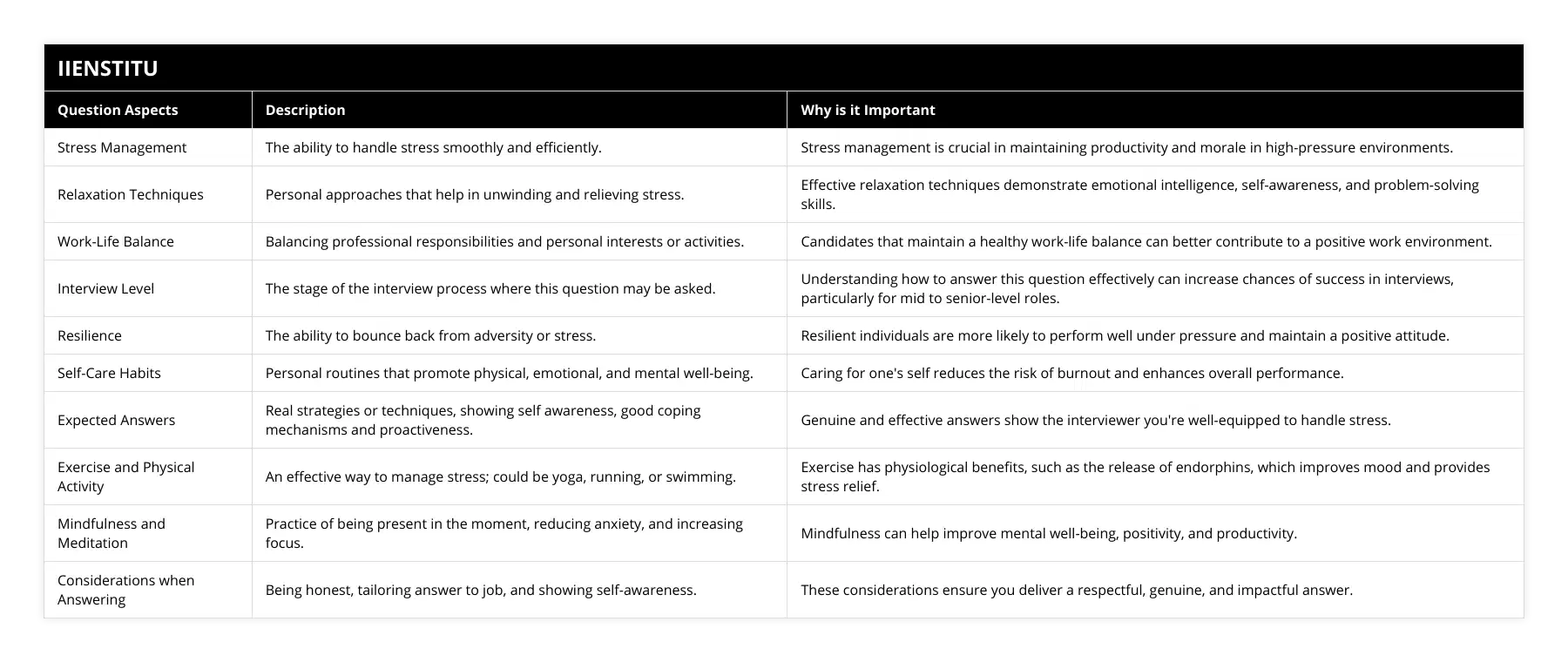
Frequently Asked Questions
How do you typically cope with stressful situations at work?
Coping with stressful situations at work is crucial for maintaining productivity and well-being. There are several strategies that individuals can employ to manage stress effectively.
Prioritizing Tasks
One effective way to cope with stress is to prioritize tasks based on their importance and urgency. This helps in focusing on the most critical tasks and avoiding unnecessary stress.
Create a to-do list and rank tasks according to their priority. Tackle high-priority tasks first and allocate sufficient time for each.
Time Management
Effective time management is key to reducing stress at work. Plan your day in advance and allocate specific time slots for different tasks.
Use time-tracking tools to monitor your progress and ensure you're staying on schedule. Take regular breaks to avoid burnout and maintain focus.
Delegation and Collaboration
Don't hesitate to delegate tasks to colleagues when appropriate. Collaborating with team members can help distribute the workload and reduce individual stress.
Communicate openly with your team and seek support when needed. Foster a supportive work environment that encourages cooperation and mutual assistance.
Mindfulness and Relaxation Techniques
Practicing mindfulness and relaxation techniques can help manage stress in the moment. Deep breathing exercises, meditation, or brief stretching can provide immediate relief.
Incorporate these techniques into your daily routine, especially during high-stress periods. Regular practice can improve overall stress resilience.
Maintaining Work-Life Balance
Strive to maintain a healthy work-life balance. Set clear boundaries between work and personal time to avoid work-related stress spilling into your personal life.
Engage in hobbies, exercise, or social activities outside of work to recharge and maintain a sense of perspective.
Seeking Support
Don't hesitate to seek support when needed. Reach out to colleagues, supervisors, or employee assistance programs for guidance and assistance.
Talking about stressful situations with trusted individuals can provide relief and help generate solutions. Remember, you don't have to face stress alone.
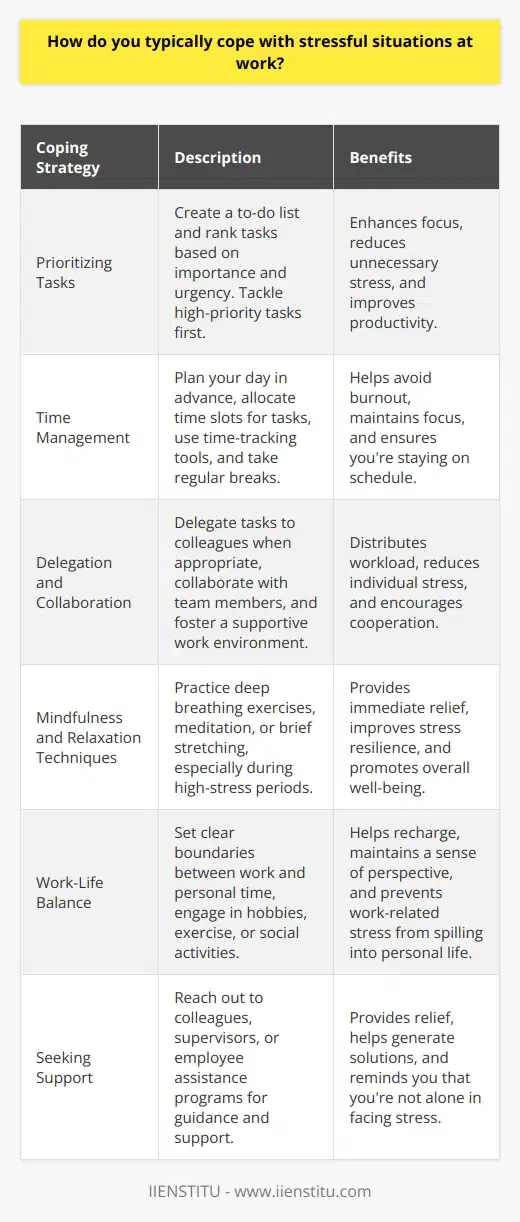
What strategies have you found to be most effective in managing pressure in your previous roles?
Throughout my previous roles, I have discovered several effective strategies for managing pressure and maintaining optimal performance. One of the most crucial techniques is proactive planning and organization. By carefully structuring my workload, prioritizing tasks, and setting realistic deadlines, I can minimize the likelihood of becoming overwhelmed by mounting responsibilities. Breaking larger projects into smaller, manageable steps allows me to focus on one task at a time, reducing stress and increasing productivity.
Effective Communication and Collaboration
Another essential strategy is fostering open communication and collaboration with colleagues and supervisors. Regularly updating my team on my progress, seeking guidance when needed, and actively participating in problem-solving discussions helps to distribute the workload and ensures that everyone is working towards a common goal. By maintaining transparency and encouraging a supportive work environment, I can more effectively navigate high-pressure situations and find creative solutions to challenges.
Stress-Management Techniques
In addition to organizational and communication strategies, I have found that incorporating stress-management techniques into my daily routine is crucial for maintaining a clear mind and a positive outlook under pressure. Taking short breaks to practice deep breathing exercises, engaging in physical activity, and maintaining a healthy work-life balance all contribute to reducing stress levels and improving overall well-being. By prioritizing self-care, I am better equipped to handle the demands of high-pressure roles and maintain consistent performance.
Continuous Learning and Adaptability
Finally, I believe that embracing a growth mindset and continuously learning from past experiences is essential for effectively managing pressure. By reflecting on previous challenges and identifying areas for improvement, I can develop a more resilient and adaptable approach to problem-solving. Staying current with industry trends, acquiring new skills, and seeking out mentorship opportunities all contribute to building confidence and enhancing my ability to navigate high-pressure situations successfully.
Conclusion
In summary, the most effective strategies I have found for managing pressure in my previous roles include proactive planning and organization, fostering open communication and collaboration, incorporating stress-management techniques, and embracing continuous learning and adaptability. By implementing these strategies consistently, I am able to maintain optimal performance, even in the face of challenging circumstances.
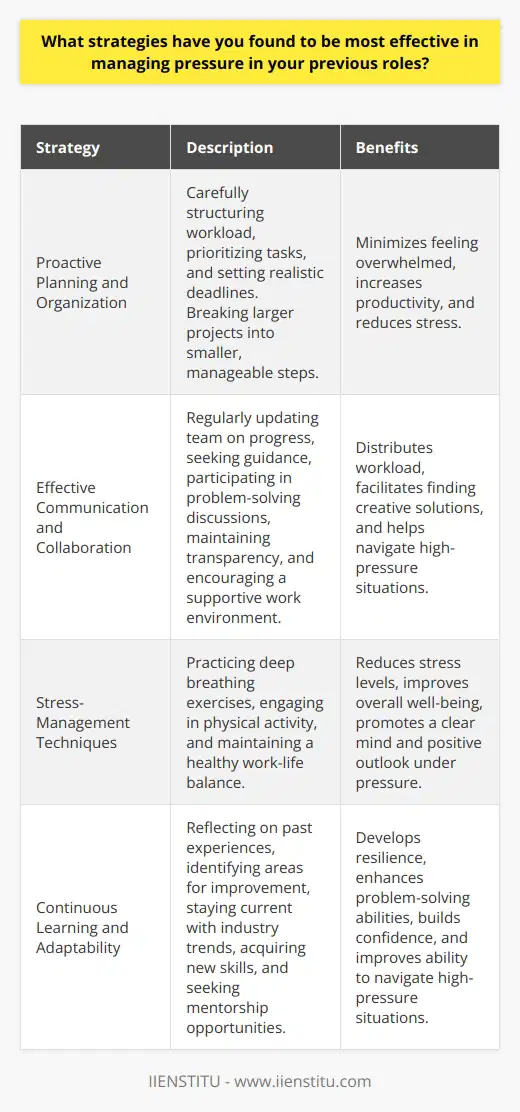
Can you describe a time when you successfully handled a high-pressure situation and what you learned from the experience?
One particularly challenging high-pressure situation I encountered was during my internship at a marketing agency. I was tasked with presenting a comprehensive campaign proposal to a major client, with only a few days to prepare. The client's expectations were high, and the success of the proposal would significantly impact the agency's future business prospects.
Preparing for the Presentation
To handle this pressure, I first broke down the project into smaller, manageable tasks. I prioritized my responsibilities and created a detailed timeline to ensure I could complete each component efficiently. I collaborated closely with my team members, delegating tasks based on their strengths and expertise. We held regular check-ins to monitor progress and address any obstacles promptly.
Conducting Thorough Research
I conducted extensive research on the client's industry, target audience, and competitors. This allowed me to develop a deep understanding of their needs and tailor the proposal accordingly. I analyzed data from previous campaigns and identified key insights that could inform our strategy. By gathering substantial evidence to support our recommendations, I felt more confident in the proposal's potential effectiveness.
Crafting a Compelling Narrative
When creating the presentation, I focused on crafting a compelling narrative that would resonate with the client. I used storytelling techniques to highlight the campaign's unique value proposition and potential impact. I incorporated visually engaging elements, such as infographics and interactive demos, to make the presentation more memorable and persuasive.
Practicing and Seeking Feedback
To ensure I was well-prepared for the presentation, I practiced extensively. I rehearsed my delivery multiple times, focusing on pacing, clarity, and enthusiasm. I sought feedback from my supervisor and colleagues, incorporating their suggestions to refine my content and delivery. This process helped me build confidence and anticipate potential questions or concerns the client might raise.
Delivering the Presentation
On the day of the presentation, I arrived early to set up and test the technology. I took a few moments to center myself and visualize a successful outcome. During the presentation, I maintained a calm and professional demeanor, even when faced with challenging questions. I actively listened to the client's feedback and addressed their concerns thoughtfully, demonstrating my expertise and adaptability.
Learning from the Experience
The presentation was a success, and the client approved the campaign proposal. This experience taught me valuable lessons about handling high-pressure situations. I learned the importance of thorough preparation, effective time management, and collaborating with a supportive team. I discovered the power of storytelling in persuasive communication and the value of seeking feedback to improve my work.
Moreover, I realized that staying calm and focused under pressure is crucial. By breaking down challenges into smaller tasks and maintaining a positive mindset, I could navigate stressful situations more effectively. This experience boosted my confidence in my abilities and prepared me to tackle future high-stakes projects with greater ease and resilience.
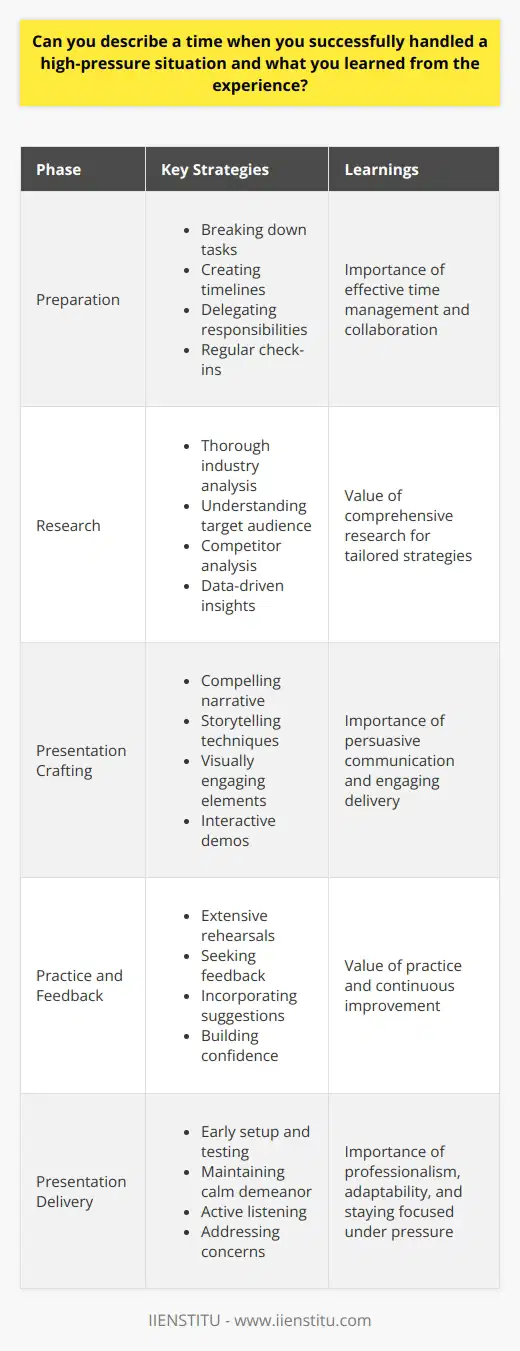
What relaxes you during stressful times?
During stressful times, engaging in activities that promote relaxation and reduce anxiety is crucial for maintaining overall well-being. Different individuals find solace in various pursuits, depending on their preferences and personality traits. Some people may seek out quiet, introspective activities, while others might prefer more dynamic and physically engaging options. Ultimately, the key to effective stress relief lies in identifying and regularly practicing those activities that resonate with one's unique needs and provide a sense of calm and balance.
Mindfulness and Meditation
Mindfulness and meditation are powerful tools for reducing stress and promoting relaxation. These practices involve focusing on the present moment, letting go of distracting thoughts, and cultivating a sense of inner peace. By setting aside dedicated time each day to engage in mindfulness exercises, such as deep breathing, guided imagery, or silent contemplation, individuals can train their minds to be more resilient in the face of stress. Regular practice can lead to improved emotional regulation, increased self-awareness, and a greater capacity to handle challenging situations with clarity and composure.
Benefits of Mindfulness and Meditation
Reduces anxiety and stress levels
Improves emotional regulation and self-awareness
Enhances mental clarity and focus
Promotes a sense of inner peace and calm
Physical Exercise and Outdoor Activities
Engaging in physical exercise and outdoor activities can be highly effective in reducing stress and promoting relaxation. When we exercise, our bodies release endorphins, which are natural mood-enhancers that help alleviate stress and improve overall well-being. Whether it's going for a jog, practicing yoga, or participating in a team sport, regular physical activity provides an outlet for pent-up energy and tension. Moreover, spending time in nature, such as taking a hike or simply sitting in a park, can have a calming effect on the mind and body, helping to reduce stress and restore a sense of balance.
Benefits of Physical Exercise and Outdoor Activities
Releases endorphins, which improve mood and reduce stress
Provides an outlet for pent-up energy and tension
Promotes physical health and well-being
Offers opportunities to connect with nature and find calm
Creative Pursuits and Hobbies
Engaging in creative pursuits and hobbies can be a powerful way to relax and de-stress. When we immerse ourselves in activities that we enjoy and that allow us to express our creativity, we enter a state of flow, where our minds are fully engaged and our worries fade into the background. Whether it's painting, writing, playing music, or crafting, dedicating time to these pursuits can provide a much-needed break from the stresses of daily life. Moreover, the sense of accomplishment that comes from creating something tangible can boost self-esteem and contribute to overall well-being.
Benefits of Creative Pursuits and Hobbies
Allows for self-expression and creativity
Promotes a state of flow and mental engagement
Provides a break from daily stresses and worries
Boosts self-esteem through a sense of accomplishment
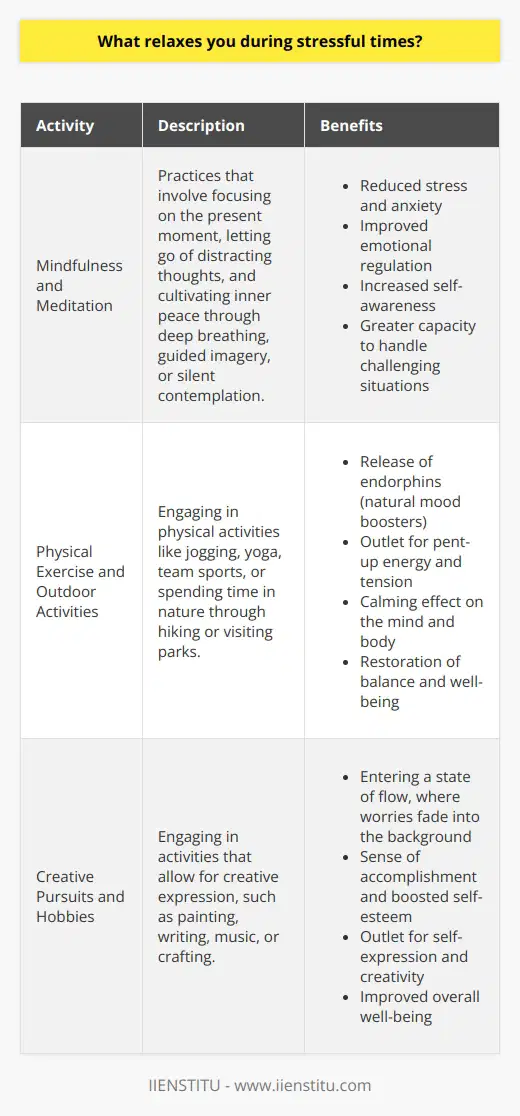
How do you manage stress and maintain a healthy work-life balance?
Managing stress and maintaining a healthy work-life balance are crucial for overall well-being and productivity. One effective way to achieve this is through proper time management and prioritization. By creating a schedule and allocating sufficient time for work, personal life, and self-care activities, individuals can ensure that they are not neglecting any important aspects of their lives. It is also essential to set realistic goals and expectations to avoid overwhelming oneself with unnecessary pressure.
The Importance of Self-Care
Engaging in regular self-care activities is another key component of managing stress and maintaining balance. This can include exercise, meditation, hobbies, or spending time with loved ones. Taking breaks throughout the day to recharge and refocus can also help prevent burnout and increase overall productivity. Additionally, practicing mindfulness and being present in the moment can help reduce stress and improve mental clarity.
Establishing Boundaries
Setting clear boundaries between work and personal life is also crucial for maintaining balance. This means establishing specific work hours, avoiding work-related tasks during personal time, and learning to say no to excessive demands or commitments. By protecting personal time and space, individuals can ensure that they have the opportunity to recharge and pursue activities that bring them joy and fulfillment.
Seeking Support
It is also important to recognize when stress levels become unmanageable and to seek support when needed. This can include reaching out to friends, family, or mental health professionals for guidance and assistance. Many workplaces also offer employee assistance programs or stress management resources that can provide additional support.
Conclusion
In conclusion, managing stress and maintaining a healthy work-life balance require a proactive and holistic approach. By prioritizing self-care, setting boundaries, and seeking support when needed, individuals can effectively navigate the demands of work and personal life while promoting overall well-being and success. Remember, taking care of oneself is not a luxury but a necessity for long-term happiness and fulfillment.
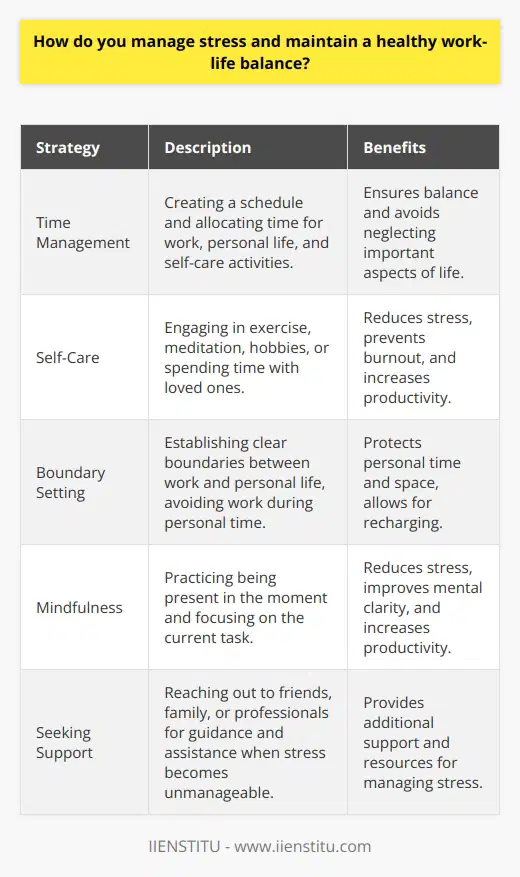
Can you describe a specific technique or activity that helps you unwind and destress during challenging periods?
During challenging periods, engaging in physical exercise serves as an effective technique for unwinding and reducing stress. Regular exercise, such as jogging, cycling, or swimming, stimulates the release of endorphins, which are natural mood-enhancers. These endorphins help to alleviate stress, improve overall well-being, and promote a sense of relaxation. Additionally, physical activity provides a healthy distraction from stressful thoughts and allows individuals to focus on the present moment. Exercise also helps to regulate sleep patterns, which is essential for managing stress levels and maintaining mental clarity. Furthermore, engaging in physical activity outdoors, such as hiking or playing sports, offers the added benefits of fresh air and exposure to nature, which have been shown to have calming effects on the mind and body.
The Benefits of Mindfulness Meditation
Mindfulness meditation is another powerful tool for reducing stress and promoting relaxation during challenging times. This technique involves focusing one's attention on the present moment, observing thoughts and feelings without judgment. By practicing mindfulness regularly, individuals can develop a greater sense of awareness and acceptance, which helps to reduce the impact of stressful thoughts and emotions. Mindfulness meditation can be practiced in various forms, such as sitting meditation, walking meditation, or even mindful breathing exercises. Research has shown that regular mindfulness practice can lead to significant reductions in stress, anxiety, and depression, as well as improvements in overall well-being and resilience. Additionally, mindfulness can be easily incorporated into daily life, making it a convenient and accessible tool for managing stress.
Engaging in Creative Hobbies
Participating in creative hobbies is another effective way to unwind and destress during challenging periods. Engaging in activities such as painting, drawing, writing, or playing a musical instrument allows individuals to express themselves and channel their emotions in a healthy manner. These creative pursuits provide a sense of accomplishment and help to shift focus away from stressful thoughts and worries. Additionally, the act of creating something can be deeply satisfying and can help to boost self-esteem and confidence. Creative hobbies also offer opportunities for social connection and support, as individuals can join classes, workshops, or online communities to share their passions and connect with others who have similar interests. Ultimately, engaging in creative hobbies provides a positive outlet for stress and helps to promote overall well-being and resilience.
The Power of Social Support
Seeking social support is a crucial aspect of managing stress and maintaining well-being during challenging times. Connecting with friends, family members, or a supportive community can provide a sense of belonging and help to alleviate feelings of isolation and loneliness. Talking to others about one's concerns and challenges can offer new perspectives and help to reduce the burden of stress. Additionally, engaging in social activities, such as volunteering or participating in group hobbies, can provide a sense of purpose and help to shift focus away from personal struggles. Research has consistently shown that individuals with strong social support networks tend to have better mental health outcomes and are more resilient in the face of stress and adversity. Therefore, prioritizing social connections and seeking support from others is an essential technique for unwinding and destressing during difficult periods.
Cultivating Gratitude and Positive Thinking
Practicing gratitude and maintaining a positive outlook are powerful tools for managing stress and promoting well-being. Taking time each day to reflect on the things one is grateful for, no matter how small, can help to shift focus away from negative thoughts and worries. This practice can be as simple as keeping a gratitude journal or sharing appreciations with others. Additionally, cultivating a positive mindset involves challenging negative self-talk and reframing stressful situations in a more constructive light. This can be achieved through techniques such as positive affirmations, visualization, or cognitive restructuring. Research has shown that individuals who regularly practice gratitude and maintain a positive outlook tend to have lower levels of stress, anxiety, and depression, as well as greater overall life satisfaction. Therefore, incorporating gratitude and positive thinking into daily life is a valuable technique for unwinding and destressing during challenging times.
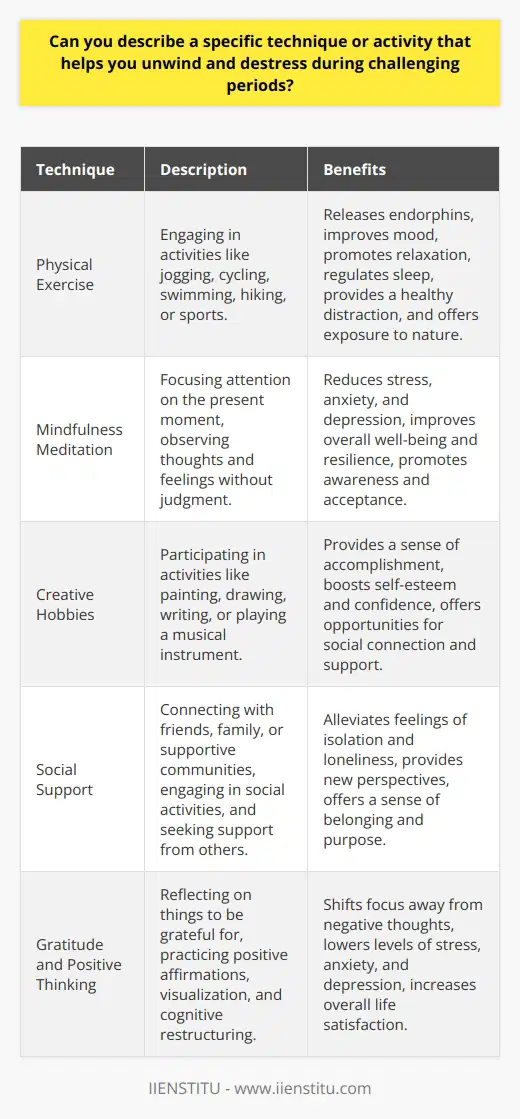
What activities or techniques do you find most effective in helping you relax during stressful times?
During stressful times, engaging in activities that promote relaxation and reduce anxiety is crucial for maintaining well-being. One of the most effective techniques for relaxation is mindfulness meditation. Mindfulness involves focusing on the present moment and observing thoughts and feelings without judgment. By practicing mindfulness regularly, individuals can develop a greater sense of calm and emotional balance, even in the face of stress.
Physical Exercise
Another powerful tool for managing stress is physical exercise. Engaging in regular physical activity, such as walking, jogging, or yoga, can help release endorphins, reduce muscle tension, and improve overall mood. Exercise also provides a healthy distraction from stressful thoughts and can help individuals feel more energized and resilient in the face of challenges.
Connecting with Nature
Spending time in nature can also be a highly effective way to relax and reduce stress. Whether it's taking a walk in a park, gardening, or simply sitting outside and enjoying the fresh air, being in nature can help individuals feel more grounded and connected to the world around them. Nature has a calming effect on the mind and body, and can help put stressful thoughts and worries into perspective.
Creative Pursuits
Engaging in creative activities, such as drawing, painting, writing, or playing music, can also be a powerful way to relax and reduce stress. Creative pursuits allow individuals to express themselves and focus on something positive and enjoyable, rather than dwelling on stressful thoughts or situations. By immersing themselves in a creative activity, individuals can experience a sense of flow and relaxation that can help them feel more centered and calm.
Social Support
Finally, seeking out social support from friends, family, or a therapist can be an important way to manage stress and promote relaxation. Talking to someone about stressful experiences or feelings can help individuals gain perspective and feel less alone in their struggles. Social support can also provide a sense of connection and belonging that can be highly comforting during times of stress.
Combining Techniques
Ultimately, the most effective approach to relaxation during stressful times may involve a combination of different techniques and activities. By experimenting with different strategies and finding what works best for them, individuals can develop a personalized toolkit for managing stress and promoting well-being. Whether it's through mindfulness, exercise, time in nature, creative pursuits, or social support, there are many ways to find calm and relaxation in the face of life's challenges.
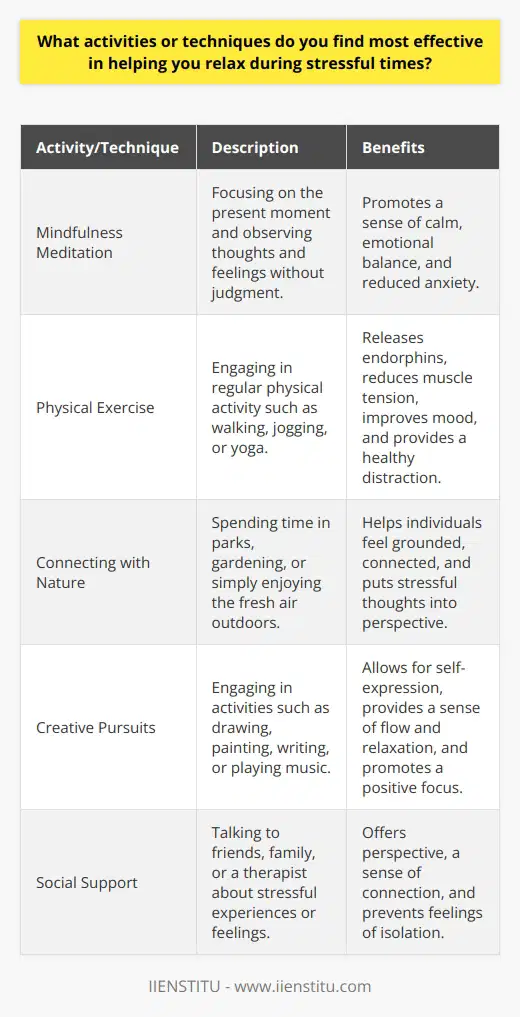
Can you provide some examples of how you manage stress and maintain a sense of calm in high-pressure situations?
Managing stress and maintaining a sense of calm in high-pressure situations is crucial for overall well-being and productivity. One effective strategy is to practice mindfulness and deep breathing exercises regularly. These techniques help to anchor the mind in the present moment and reduce anxiety. Another helpful approach is to prioritize tasks and break them down into manageable steps, focusing on one task at a time. This prevents overwhelming feelings and allows for a more structured and efficient workflow.
The Power of Positive Self-Talk
Engaging in positive self-talk is another powerful tool for managing stress in challenging situations. Reframing negative thoughts into more constructive and optimistic ones can significantly impact one's mindset and ability to cope with pressure. For example, instead of thinking, "I can't handle this," try telling yourself, "I have faced challenges before, and I can overcome this one too." Cultivating a growth mindset and embracing challenges as opportunities for learning and development can also help maintain a sense of calm and resilience.
The Importance of Self-Care
Incorporating regular self-care practices into one's routine is essential for managing stress and promoting overall well-being. This can include engaging in hobbies or activities that bring joy and relaxation, such as reading, painting, or spending time in nature. Exercise is another powerful stress-reducer, as it releases endorphins and helps to clear the mind. Maintaining a balanced and nutritious diet, staying hydrated, and getting enough sleep are also crucial for managing stress and maintaining a sense of calm.
Building a Support System
Having a strong support system is invaluable when it comes to managing stress in high-pressure situations. Surrounding oneself with positive and supportive individuals who can offer encouragement, advice, and a listening ear can make a significant difference in one's ability to cope with stress. This can include family members, friends, colleagues, or even a professional therapist or counselor. Knowing that there are people to turn to for support and guidance can provide a sense of comfort and help to maintain a sense of calm in challenging times.
Practicing Time Management and Boundaries
Effective time management and setting clear boundaries are also essential for managing stress and maintaining a sense of calm. This involves learning to say no to non-essential tasks or commitments and prioritizing self-care and personal time. It is important to recognize one's limits and avoid overextending oneself, as this can lead to burnout and increased stress levels. By setting realistic goals, breaking tasks into smaller, manageable steps, and allowing for flexibility and adjustments as needed, one can better navigate high-pressure situations and maintain a sense of control and calm.
In conclusion, managing stress and maintaining a sense of calm in high-pressure situations requires a multi-faceted approach that includes mindfulness, positive self-talk, self-care, building a support system, and practicing effective time management and boundaries. By incorporating these strategies into one's daily life, it is possible to cultivate greater resilience, adaptability, and overall well-being, even in the face of challenging circumstances.
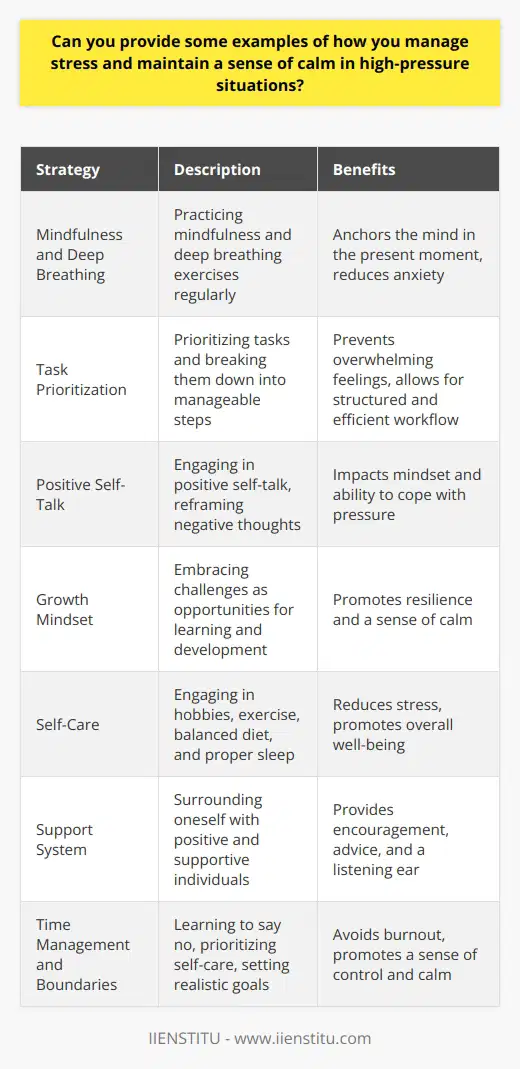
In your experience, what are some of the best ways to unwind and recharge when faced with stressful circumstances?
Unwinding and recharging during stressful situations are crucial for maintaining mental and physical well-being. One effective way to relax is through regular exercise, such as jogging or yoga, which releases endorphins and reduces stress hormones. Engaging in hobbies like reading, painting, or gardening can also provide a much-needed distraction from stressors. Practicing mindfulness techniques, including deep breathing exercises and meditation, helps focus the mind on the present moment and reduces anxiety.
The Importance of Social Support
Connecting with friends and family is another powerful tool for managing stress. Talking about concerns with loved ones can provide a fresh perspective and emotional support. Participating in social activities, such as game nights or outdoor adventures, fosters a sense of belonging and helps take the mind off stressful thoughts. Building a strong support network is essential for navigating challenging times.
Creating a Relaxing Environment
The physical environment plays a significant role in stress management. Creating a calm and organized living space can promote feelings of tranquility. Decluttering, adding plants, and using soothing colors can transform a room into a peaceful retreat. Establishing a dedicated relaxation area, such as a cozy reading nook or a quiet meditation corner, provides a space to unwind and recharge.
The Power of Nature
Spending time in nature is a simple yet effective way to reduce stress. Taking a walk in the park, hiking in the woods, or sitting by a lake can provide a sense of calm and perspective. Nature's beauty and tranquility have a restorative effect on the mind and body. Even brief encounters with the outdoors, such as tending to a small garden or watching a sunset, can help alleviate stress.
Prioritizing Self-Care
Self-care practices are essential for managing stress and promoting overall well-being. Getting enough sleep, maintaining a balanced diet, and staying hydrated are fundamental aspects of self-care. Engaging in activities that bring joy and relaxation, such as taking a warm bath, listening to music, or practicing a favorite hobby, can help reduce stress and improve mood. Making time for self-care, even in small increments, is crucial for recharging and facing challenges with renewed energy.
The Benefits of Laughter
Laughter is a powerful stress-reliever that should not be underestimated. Watching a funny movie, sharing jokes with friends, or attending a comedy show can provide a much-needed mental break. Laughter releases endorphins, reduces muscle tension, and boosts the immune system. Incorporating humor and lightheartedness into daily life can help maintain a positive outlook and reduce the impact of stressors.
In conclusion, unwinding and recharging during stressful times involve a combination of strategies tailored to individual preferences. Regular exercise, engaging in hobbies, practicing mindfulness, connecting with others, creating a relaxing environment, spending time in nature, prioritizing self-care, and embracing laughter are all effective ways to manage stress. By incorporating these techniques into daily routines, individuals can build resilience and maintain mental and physical well-being in the face of challenging circumstances.
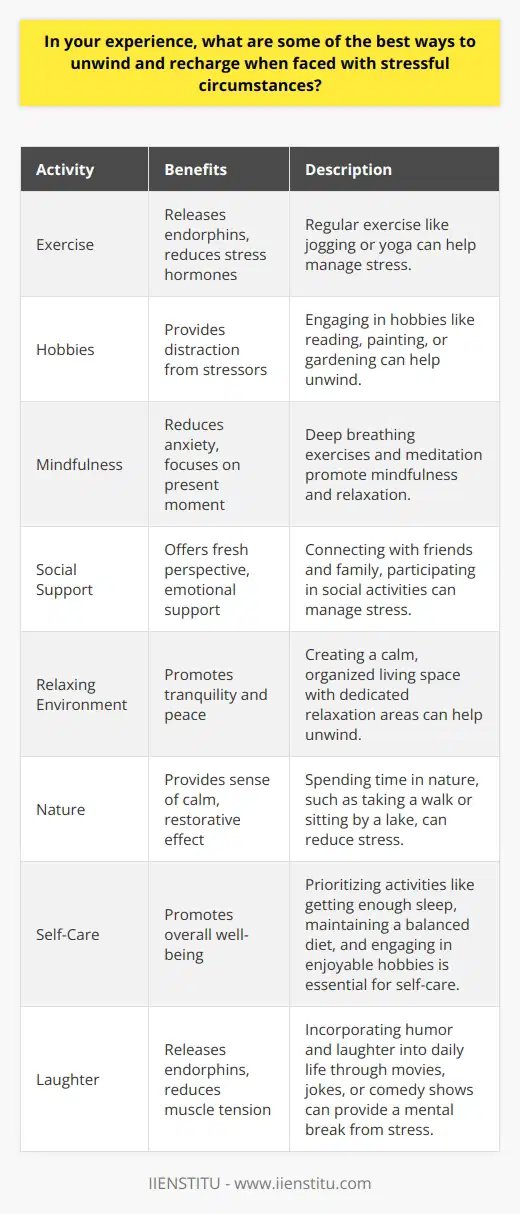
What relaxes you during stressful times?
During stressful times, various activities and techniques can help individuals relax and manage their stress levels effectively. Engaging in physical exercise, such as walking, jogging, or practicing yoga, releases endorphins and reduces tension in the body. Mindfulness meditation and deep breathing exercises promote mental clarity and emotional stability by focusing on the present moment. Pursuing hobbies and creative outlets, like painting, gardening, or playing a musical instrument, allows for self-expression and provides a sense of accomplishment. Connecting with loved ones and maintaining strong social support systems offer comfort and a chance to share concerns openly. Spending time in nature, whether through hiking or simply sitting in a park, fosters a sense of tranquility and helps put stressors into perspective. Incorporating relaxation techniques, such as progressive muscle relaxation or visualization, can alleviate physical and mental tension. Establishing a consistent sleep routine and creating a peaceful bedtime environment contribute to better sleep quality and improved stress management. Engaging in activities that bring joy and laughter, like watching a comedy or playing with a pet, promotes positive emotions and reduces stress hormones. Ultimately, finding personalized stress-relieving methods that resonate with an individual's preferences and lifestyle is crucial for maintaining overall well-being during challenging times.
Physical Exercise
Engaging in regular physical exercise is a highly effective way to relax and reduce stress. Activities such as walking, jogging, swimming, or practicing yoga help release endorphins, which are natural mood-enhancers. Exercise also helps reduce muscle tension and improves overall physical health. Incorporating physical activity into a daily routine, even in small increments, can significantly contribute to better stress management and emotional well-being.
Mindfulness and Meditation
Practicing mindfulness and meditation techniques can greatly assist in relaxation during stressful periods. Mindfulness involves focusing on the present moment and acknowledging thoughts and emotions without judgment. Meditation, such as deep breathing exercises or guided imagery, helps calm the mind and reduce anxiety. Regular practice of these techniques can lead to increased mental clarity, emotional stability, and a greater sense of inner peace.
Hobbies and Creative Pursuits
Engaging in hobbies and creative activities can be highly therapeutic during times of stress. Pursuits such as painting, drawing, writing, gardening, or playing a musical instrument provide a means of self-expression and offer a sense of accomplishment. These activities allow individuals to focus on something enjoyable and fulfilling, temporarily diverting their attention from stressors. Engaging in hobbies and creative outlets can foster a sense of relaxation and promote overall well-being.
Social Support and Connection
Maintaining strong social connections and seeking support from loved ones can be incredibly comforting during stressful times. Talking to friends, family members, or a trusted confidant about concerns and challenges can provide a sense of relief and validation. Engaging in social activities, such as shared meals or enjoyable outings, can help reduce feelings of isolation and promote a sense of belonging. Building and nurturing supportive relationships is crucial for effective stress management.
Nature and Outdoor Activities
Spending time in nature and engaging in outdoor activities can have a profound relaxing effect. Being surrounded by natural beauty, fresh air, and tranquil environments can help put stressors into perspective and promote a sense of calm. Activities such as hiking, camping, or simply taking a walk in a park can provide a much-needed break from daily pressures. Connecting with nature can also foster a sense of awe and appreciation, helping individuals find inner peace and relaxation.
Relaxation Techniques
Incorporating specific relaxation techniques into a stress management routine can be highly beneficial. Practices such as progressive muscle relaxation, where individuals systematically tense and relax different muscle groups, can help release physical tension. Visualization exercises, which involve imagining peaceful and calming scenarios, can promote mental relaxation and reduce anxiety. Deep breathing techniques, such as diaphragmatic breathing, can help regulate the body's stress response and induce a state of calmness.
Adequate Sleep and Bedtime Routine

How do you handle stress and pressure?
Stress and pressure are inevitable aspects of life that everyone encounters at some point. The way individuals handle these challenges can significantly impact their overall well-being and success. Effective stress management involves a combination of strategies that address both the mental and physical aspects of stress.
Identifying Stress Triggers
The first step in managing stress is to identify the sources of stress in your life. Common stress triggers include work-related pressures, financial concerns, relationship issues, and health problems. Once you recognize your stress triggers, you can develop targeted strategies to address them.
Prioritizing Self-Care
Self-care is crucial in managing stress and pressure. Engage in activities that promote relaxation and reduce tension. Examples include regular exercise, meditation, deep breathing exercises, and hobbies you enjoy. Prioritize getting enough sleep and maintaining a balanced diet to support your physical and mental health.
Time Management Techniques
Effective time management can help alleviate stress by ensuring that you allocate sufficient time for important tasks. Create a schedule that balances work, leisure, and personal responsibilities. Break large projects into smaller, manageable steps to avoid feeling overwhelmed. Learn to prioritize tasks based on their urgency and importance.
Establishing Boundaries
Setting boundaries is essential for managing stress and pressure. Learn to say "no" to non-essential tasks or commitments that can add unnecessary stress to your life. Communicate your limits and expectations clearly to others, whether it's at work or in personal relationships.
Building a Support System
Having a strong support system can provide a buffer against stress. Surround yourself with positive and supportive people who can offer encouragement and guidance during challenging times. Don't hesitate to reach out to friends, family, or professionals when you need help or advice.
Practicing Mindfulness
Mindfulness is a powerful tool for managing stress and pressure. It involves being present in the moment and observing your thoughts and emotions without judgment. Regular mindfulness practice can help you develop a calmer and more balanced perspective on life's challenges.
Reframing Negative Thoughts
Stress and pressure often stem from negative thought patterns. Challenge negative self-talk and reframe your thoughts in a more positive and realistic light. Instead of focusing on worst-case scenarios, consider alternative perspectives and potential solutions.
Seeking Professional Help
If stress and pressure become overwhelming and interfere with your daily functioning, don't hesitate to seek professional help. Therapists and counselors can provide valuable support and guidance in developing effective coping strategies tailored to your specific needs.
Conclusion
Managing stress and pressure is an ongoing process that requires a proactive approach. By identifying stress triggers, prioritizing self-care, practicing effective time management, building a support system, and seeking help when needed, you can develop resilience and maintain a healthy balance in the face of life's challenges.

What stress-reducing techniques do you find most effective?
Stress is a pervasive issue in modern society, affecting individuals from all walks of life. Developing effective stress-reducing techniques is crucial for maintaining physical and mental well-being. Among the various strategies available, some prove to be more beneficial than others in managing stress levels.
Exercise and Physical Activity
Engaging in regular exercise and physical activity is one of the most potent stress-reducing techniques. Physical exertion triggers the release of endorphins, which are natural mood elevators. These endorphins promote feelings of happiness and relaxation, counteracting the negative effects of stress. Additionally, exercise helps to improve sleep quality, which is essential for stress management.
Mindfulness Meditation
Mindfulness meditation has gained significant popularity as a stress-reducing technique in recent years. This practice involves focusing one's attention on the present moment, observing thoughts and emotions without judgment. By cultivating mindfulness, individuals can develop a greater sense of calm and inner peace. Regular meditation practice has been shown to reduce stress levels, improve emotional regulation, and enhance overall well-being.
Deep Breathing Exercises
Deep breathing exercises are simple yet highly effective in reducing stress. When stressed, people tend to take shallow breaths, which can exacerbate feelings of anxiety. By consciously taking slow, deep breaths, individuals can activate the body's relaxation response. This technique helps to lower heart rate, decrease muscle tension, and promote a sense of tranquility.
Social Support and Connection
Maintaining strong social connections and seeking support from loved ones is a powerful stress-reducing strategy. Sharing concerns and emotions with trusted friends or family members can provide a sense of relief and validation. Engaging in enjoyable activities with others, such as hobbies or social outings, can also serve as a distraction from stressors and promote positive emotions.
Time Management and Prioritization
Effective time management and prioritization skills are essential for reducing stress levels. By organizing tasks, setting realistic goals, and allocating time wisely, individuals can minimize feelings of overwhelm and anxiety. Learning to say no to non-essential commitments and creating a balanced schedule can also contribute to stress reduction.
Conclusion
In conclusion, incorporating stress-reducing techniques into daily life is crucial for overall well-being. Regular exercise, mindfulness meditation, deep breathing exercises, social support, and effective time management are among the most powerful strategies for managing stress. By consistently practicing these techniques, individuals can cultivate resilience and maintain a sense of balance in the face of life's challenges.
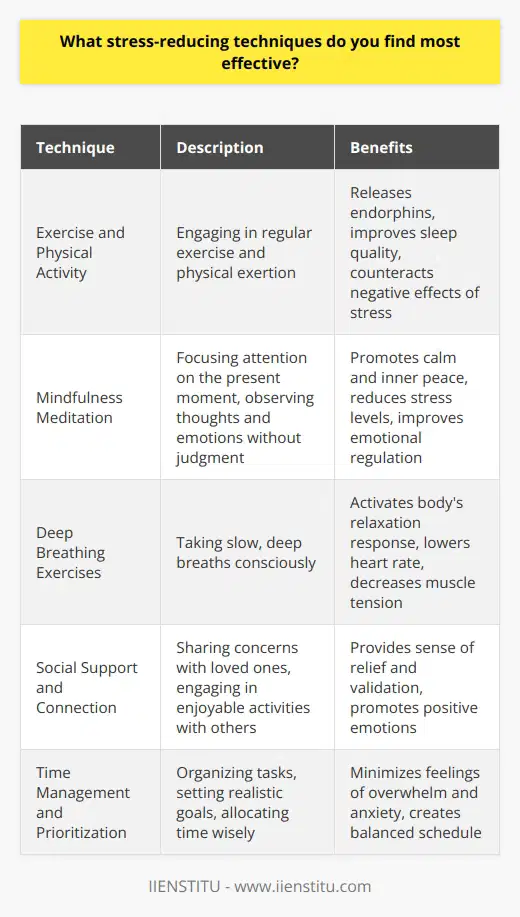
How do you typically respond when faced with a stressful situation?
When faced with a stressful situation, individuals tend to respond in various ways, depending on their personality, life experiences, and coping mechanisms. Some people may approach stress with a problem-solving mindset, actively seeking solutions to the challenges they face. Others might resort to emotion-focused coping strategies, such as seeking support from loved ones or engaging in stress-reducing activities like exercise or meditation.
Fight or Flight Response
The body's natural response to stress is known as the "fight or flight" response, which is triggered by the release of hormones like adrenaline and cortisol. This response prepares the body to either confront the stressor head-on or escape from the situation. In modern times, however, many stressors cannot be resolved through these primitive responses, leading individuals to develop alternative coping strategies.
Problem-Focused Coping
Problem-focused coping involves actively addressing the source of stress and finding practical solutions to mitigate its impact. This approach is often more effective for situations that are within an individual's control. By breaking down the problem into smaller, manageable parts and developing a plan of action, individuals can regain a sense of control and reduce their stress levels.
Emotion-Focused Coping
Emotion-focused coping, on the other hand, aims to manage the emotional distress caused by a stressful situation. This may involve seeking social support, practicing relaxation techniques, or engaging in activities that promote positive emotions. While emotion-focused coping does not directly address the source of stress, it can help individuals build resilience and maintain emotional well-being during challenging times.
Adaptive and Maladaptive Coping Strategies
It is important to note that not all coping strategies are equally effective or healthy. Adaptive coping strategies, such as problem-solving, seeking support, and practicing self-care, can help individuals effectively manage stress and maintain overall well-being. Maladaptive coping strategies, such as substance abuse, avoidance, or excessive rumination, may provide temporary relief but can ultimately exacerbate stress and lead to negative consequences.
The Role of Resilience
Resilience, or the ability to bounce back from adversity, plays a crucial role in how individuals respond to stressful situations. People with high levels of resilience are more likely to view challenges as opportunities for growth and to employ adaptive coping strategies. Resilience can be developed and strengthened through experiences, social support, and personal development.
Mindfulness and Stress Management
Mindfulness, which involves being present and non-judgmentally aware of one's thoughts and emotions, has emerged as a valuable tool for stress management. By practicing mindfulness techniques, such as meditation or deep breathing, individuals can learn to observe their stress responses without getting caught up in them, allowing for more effective coping and decision-making.
Seeking Professional Help
In cases where stress becomes overwhelming or persistent, seeking the help of a mental health professional can be beneficial. Therapists can provide guidance in developing effective coping strategies, processing emotions, and addressing underlying issues that may contribute to stress.
Ultimately, the way an individual responds to a stressful situation is a complex interplay of personal factors, the nature of the stressor, and available resources. By cultivating self-awareness, building resilience, and employing a combination of problem-focused and emotion-focused coping strategies, individuals can learn to navigate stressful situations more effectively and maintain overall well-being.
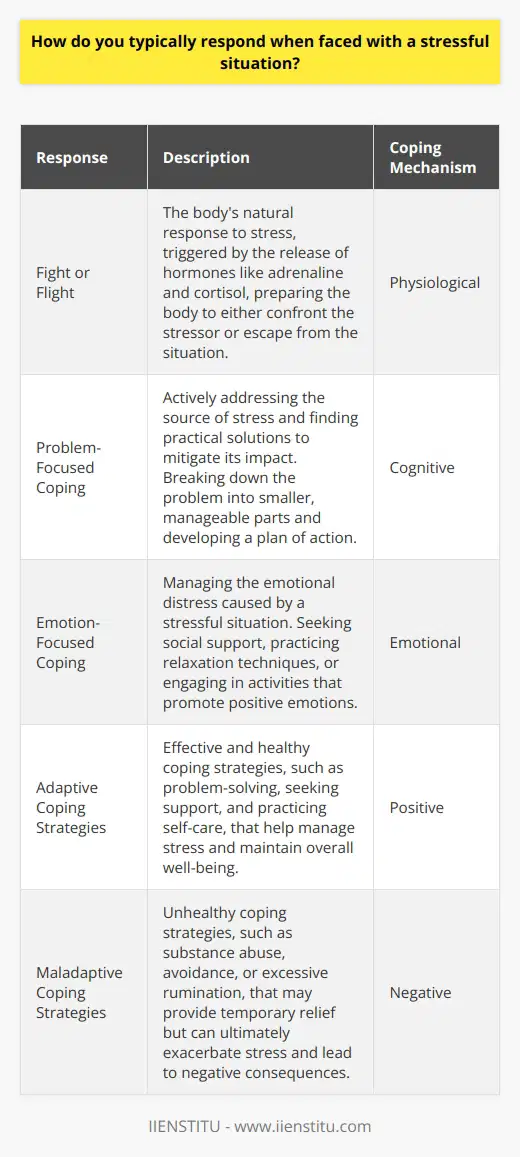
What strategies do you employ to manage stress effectively in high-pressure environments?
Managing stress effectively in high-pressure environments requires a combination of personal strategies and organizational support. One key approach is to prioritize tasks and focus on the most critical objectives. This involves setting clear goals, breaking them down into manageable steps, and allocating time and resources accordingly. By concentrating on essential tasks, individuals can reduce feelings of overwhelm and maintain a sense of control.
Effective Time Management
Another crucial strategy is effective time management. This includes planning and scheduling activities, setting realistic deadlines, and minimizing distractions. Techniques such as the Pomodoro Technique, which involves working in focused intervals followed by short breaks, can help maintain productivity and reduce stress. Additionally, learning to delegate tasks and seeking assistance when needed can alleviate excessive workloads and prevent burnout.
Stress-Reduction Techniques
Incorporating stress-reduction techniques into daily routines is also essential. Regular exercise, such as yoga or cardiovascular activities, can help release endorphins, reduce tension, and improve overall well-being. Mindfulness practices, including meditation and deep breathing exercises, can promote relaxation and mental clarity. Engaging in hobbies or leisure activities outside of work can provide a much-needed break and help restore energy levels.
Maintaining Work-Life Balance
Maintaining a healthy work-life balance is another key strategy. Setting boundaries between work and personal life, such as establishing specific working hours and disconnecting from work-related communication during off-hours, can prevent work-related stress from spilling over into personal time. Prioritizing self-care activities, such as getting sufficient sleep, eating a balanced diet, and nurturing social connections, can enhance overall well-being and resilience.
Seeking Support
Finally, seeking support from colleagues, supervisors, or professional resources can be invaluable in managing stress. Open communication with team members and supervisors can help identify and address sources of stress, while also fostering a supportive work environment. Utilizing employee assistance programs or seeking guidance from mental health professionals can provide additional tools and strategies for coping with high-pressure situations.
By implementing a combination of these strategies, individuals can effectively manage stress in high-pressure environments. Prioritizing tasks, managing time effectively, incorporating stress-reduction techniques, maintaining work-life balance, and seeking support when needed can contribute to improved well-being, productivity, and overall success in demanding roles.
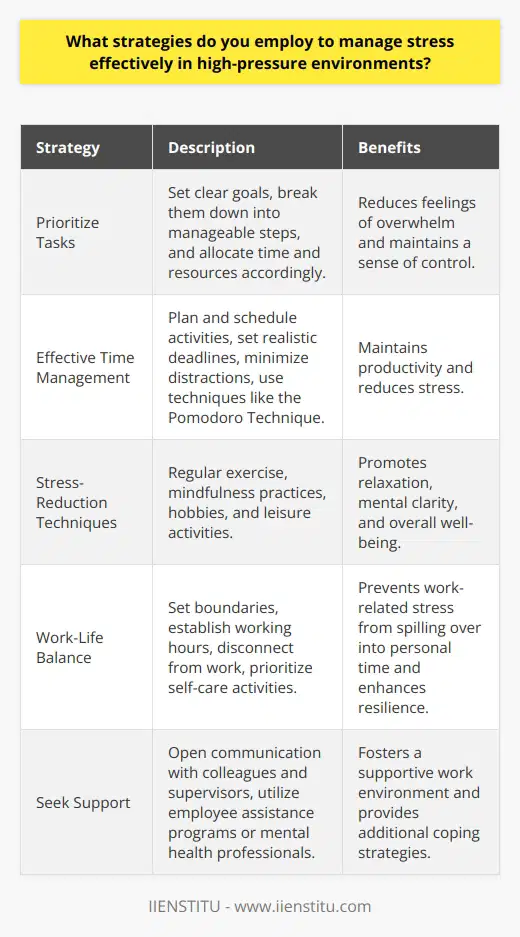
Can you describe a specific instance where you successfully handled a stressful situation, and how did you approach it?
One specific instance where I successfully handled a stressful situation was during my final year of college. I was juggling multiple deadlines for assignments and exams, while also working part-time to support myself financially. The pressure was immense, and I could feel my stress levels rising each day.
Prioritizing Tasks
To approach this stressful situation, I first took a step back and prioritized my tasks. I made a list of all my assignments and exams, along with their due dates. Then, I ranked them based on their importance and urgency. This helped me focus on the most critical tasks first and avoid feeling overwhelmed.
Breaking Down Projects
For larger assignments, I broke them down into smaller, manageable chunks. I set daily goals for myself and worked on each part of the project consistently. This approach made the workload feel less daunting and helped me maintain a steady progress.
Time Management
Effective time management was crucial in handling this stressful situation. I created a schedule that allocated specific time slots for each task, including my part-time job and self-care activities. I strictly adhered to this schedule, ensuring that I made the most of my available time.
Seeking Support
I also reached out to my support network during this challenging period. I discussed my struggles with friends, family, and professors. They provided emotional support, practical advice, and sometimes even extended deadlines when necessary. Knowing that I had people to rely on helped alleviate some of the stress.
Self-Care and Stress Management
Despite the heavy workload, I made sure to prioritize self-care. I set aside time for activities that helped me relax and recharge, such as exercise, meditation, and spending time outdoors. These moments of self-care allowed me to maintain a positive mindset and prevented burnout.
Staying Organized
Keeping my workspace and materials organized was another key factor in managing stress. I used a planner to keep track of deadlines, appointments, and to-do lists. Having a clear overview of my responsibilities helped me stay focused and avoid last-minute panic.
Celebrating Small Victories
Throughout this stressful period, I made a point to celebrate my small victories along the way. Each completed assignment or successful exam was a milestone worth acknowledging. These moments of self-recognition boosted my motivation and reminded me of my progress.
Maintaining Perspective
Finally, I tried to maintain a healthy perspective throughout the situation. I reminded myself that this stressful phase was temporary and that I had the skills and resilience to overcome it. Focusing on the bigger picture helped me avoid getting caught up in minor setbacks.
Conclusion
By prioritizing tasks, breaking down projects, managing my time effectively, seeking support, and taking care of my well-being, I successfully navigated this stressful situation. The experience taught me valuable lessons about resilience, adaptability, and the importance of self-care in the face of challenges.
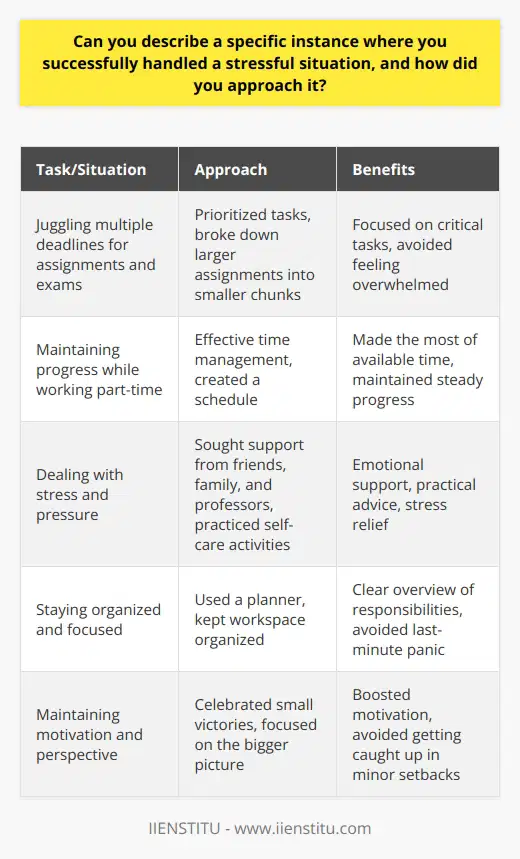
What are some common sample stress interview questions and how should they be answered?
Stress interviews are designed to assess a candidate's ability to handle pressure and think on their feet. Some common stress interview questions include asking the candidate to solve a difficult problem, respond to a hypothetical crisis, or defend an unpopular opinion. To answer these questions effectively, candidates should remain calm, take a moment to collect their thoughts, and provide a well-reasoned response that demonstrates their problem-solving skills and ability to perform under pressure.
Types of Stress Interview Questions
Problem-Solving Questions
These questions present the candidate with a challenging scenario and ask them to develop a solution. For example, "How would you handle a project with a tight deadline and limited resources?" To answer this type of question, candidates should outline a step-by-step approach to tackling the problem, prioritizing tasks, and allocating resources efficiently.
Hypothetical Crisis Scenarios
Interviewers may ask candidates to respond to a hypothetical crisis, such as a public relations disaster or a major product failure. In these situations, candidates should demonstrate their ability to assess the situation quickly, develop a plan of action, and communicate effectively with stakeholders. It's essential to remain level-headed and focus on finding a solution rather than dwelling on the problem.
Defending an Unpopular Opinion
Candidates may be asked to defend an unpopular opinion or make an argument for something they don't necessarily agree with. This tests their ability to think critically, construct a logical argument, and communicate persuasively. To answer this type of question, candidates should acknowledge the complexity of the issue, present a well-structured argument, and support their position with relevant examples or data.
Tips for Handling Stress Interview Questions
Stay Calm and Composed
When faced with a stress interview question, it's crucial to maintain a calm and professional demeanor. Take a deep breath, collect your thoughts, and avoid getting flustered or defensive. Remember that the interviewer is evaluating your ability to handle pressure, so staying composed is key.
Buy Time if Needed
If you need a moment to gather your thoughts, it's okay to ask for a brief pause before responding. You can say something like, "That's an interesting question. Let me take a moment to consider my answer." This shows that you're thoughtful and deliberate in your approach.
Structure Your Response
When answering stress interview questions, it's essential to provide a clear and well-structured response. Start by acknowledging the challenge or problem presented, then outline your approach to solving it. Use specific examples or data to support your arguments, and summarize your main points at the end.
Practice Active Listening
Pay close attention to the interviewer's questions and any additional information they provide. Ask clarifying questions if needed to ensure you fully understand the scenario or problem. Active listening demonstrates your engagement and helps you provide a more targeted and relevant response.
By familiarizing yourself with common stress interview questions and practicing these techniques, you can improve your ability to perform well under pressure and demonstrate your problem-solving skills to potential employers.
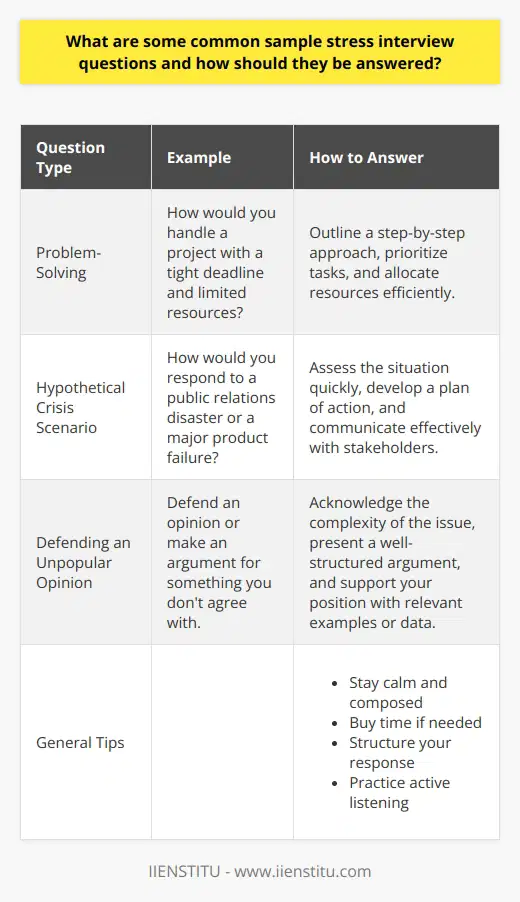
How can I prepare for sample stress interview questions to increase my chances of success?
Preparing for sample stress interview questions is crucial to increase your chances of success in a job interview. Stress interviews are designed to assess how well you perform under pressure and handle challenging situations. To prepare effectively, start by researching common stress interview questions and practicing your responses. Focus on highlighting your problem-solving skills, ability to stay calm, and professionalism in your answers.
Understand the Purpose of Stress Interviews
Stress interviews aim to evaluate your ability to think on your feet and maintain composure in high-pressure situations. Employers use these questions to gauge how you react to unexpected challenges and whether you can remain professional and focused. By understanding the purpose behind stress interviews, you can better prepare yourself mentally and emotionally for the experience.
Research Common Stress Interview Questions
Familiarize yourself with typical stress interview questions to avoid being caught off guard during the actual interview. Some common examples include:
"How would you handle a difficult client who is dissatisfied with your work?"
"Describe a time when you failed at a task and how you recovered from it."
"How do you prioritize tasks when everything seems equally important?"
By anticipating these questions, you can prepare well-thought-out responses that showcase your strengths and abilities.
Practice Your Responses
Once you have identified common stress interview questions, practice answering them out loud. This will help you become more comfortable and confident in your responses. Focus on providing specific examples from your past experiences that demonstrate your problem-solving skills, adaptability, and ability to work well under pressure. Remember to keep your answers concise and to the point.
Highlight Your Problem-Solving Skills
When answering stress interview questions, emphasize your problem-solving abilities. Provide concrete examples of how you have successfully tackled challenges in the past. Explain your thought process and the steps you took to resolve the issue. By demonstrating your analytical thinking and resourcefulness, you show the interviewer that you are capable of handling difficult situations effectively.
Stay Calm and Composed
During a stress interview, it is essential to remain calm and composed, even when faced with challenging questions. Take a deep breath before responding, and maintain a professional tone and demeanor throughout the interview. Avoid becoming defensive or confrontational, as this can reflect poorly on your ability to handle pressure. Instead, focus on providing thoughtful and well-reasoned responses.
Demonstrate Professionalism
Professionalism is key in any job interview, especially during a stress interview. Dress appropriately, arrive on time, and maintain good eye contact and posture. Show respect for the interviewer and the interview process, even if the questions seem challenging or unfair. By conducting yourself in a professional manner, you demonstrate your ability to handle stress with grace and maturity.
Learn from the Experience
After the stress interview, take time to reflect on your performance. Identify areas where you excelled and areas that need improvement. Use this experience as an opportunity to learn and grow, so you can better prepare for future interviews. Remember, the more you practice and prepare, the more confident and successful you will be in handling stress interviews.
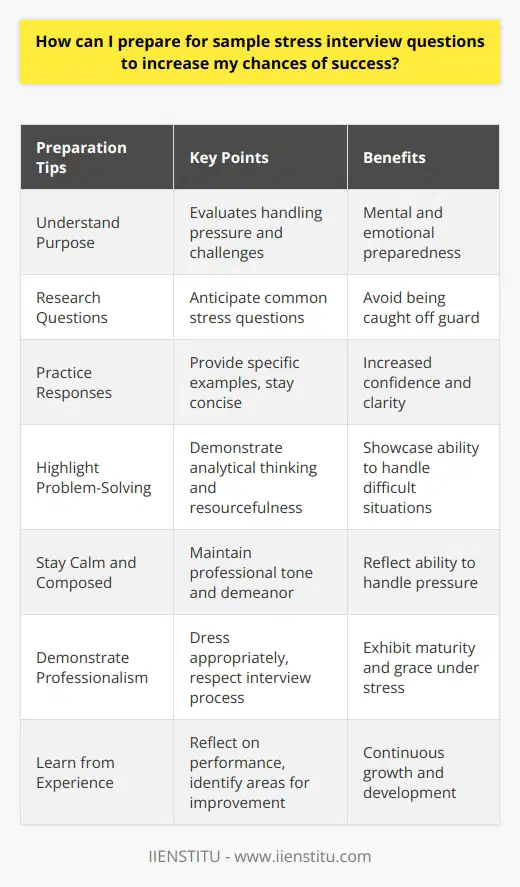
What are effective strategies for responding to sample stress interview questions during a job interview?
Responding effectively to stress interview questions during a job interview requires preparation, self-awareness, and composure. One effective strategy is to anticipate potential stress questions and practice answering them beforehand. This allows you to develop concise, thoughtful responses that showcase your problem-solving skills and ability to handle pressure. Another important aspect is maintaining a positive attitude and demonstrating enthusiasm for the opportunity, even when faced with challenging questions.
Highlighting Relevant Experiences
When answering stress interview questions, it is crucial to draw upon relevant experiences from your past. Reflect on situations where you successfully navigated high-pressure circumstances or overcame obstacles. Be specific in describing the challenges you faced, the actions you took, and the positive outcomes you achieved. By providing concrete examples, you demonstrate your resilience and adaptability, which are valuable qualities in any work environment.
Staying Calm and Composed
During a stress interview, it is essential to remain calm and composed, even if the questions become increasingly challenging. Take a moment to collect your thoughts before responding, and maintain a confident and professional demeanor throughout the interview. Avoid becoming defensive or confrontational, as this can undermine your credibility. Instead, focus on articulating your strengths, values, and unique qualifications that make you an ideal candidate for the position.
Reframing Negative Experiences
Stress interview questions may sometimes focus on past failures or setbacks. When addressing these topics, it is important to reframe negative experiences in a positive light. Acknowledge the challenges you faced, but emphasize the valuable lessons you learned and how you grew from those experiences. Demonstrate your ability to self-reflect, take responsibility, and apply the insights gained to future situations. This approach shows maturity, adaptability, and a growth mindset, which are highly valued by employers.
Asking Clarifying Questions
If a stress question seems unclear or ambiguous, don't hesitate to ask for clarification. Seeking additional information demonstrates your engagement and desire to provide a thoughtful response. It also gives you a moment to gather your thoughts and formulate a well-structured answer. Additionally, asking questions shows that you are actively listening and interested in understanding the interviewer's perspective.
Focusing on Solutions
When responding to stress interview questions, it is important to focus on solutions rather than dwelling on problems. Discuss how you approach challenges, the strategies you employ to overcome obstacles, and the proactive steps you take to prevent similar issues from arising in the future. Emphasize your problem-solving skills, creativity, and ability to think critically under pressure. By showcasing your solution-oriented mindset, you demonstrate your value as a potential employee.
Maintaining Professionalism
Throughout the stress interview, it is crucial to maintain a professional demeanor. Avoid becoming emotionally reactive or letting frustration show, even if the questions become increasingly challenging. Remain respectful towards the interviewer and the interview process. Remember that the purpose of a stress interview is to assess your ability to handle pressure and maintain composure in difficult situations. By staying professional and focused, you demonstrate your emotional intelligence and ability to navigate complex workplace dynamics.
In conclusion, responding effectively to stress interview questions requires a combination of preparation, self-awareness, and composure. By anticipating potential questions, drawing upon relevant experiences, staying calm, reframing negative situations, asking clarifying questions, focusing on solutions, and maintaining professionalism, you can successfully navigate the challenges of a stress interview and showcase your strengths as a candidate.
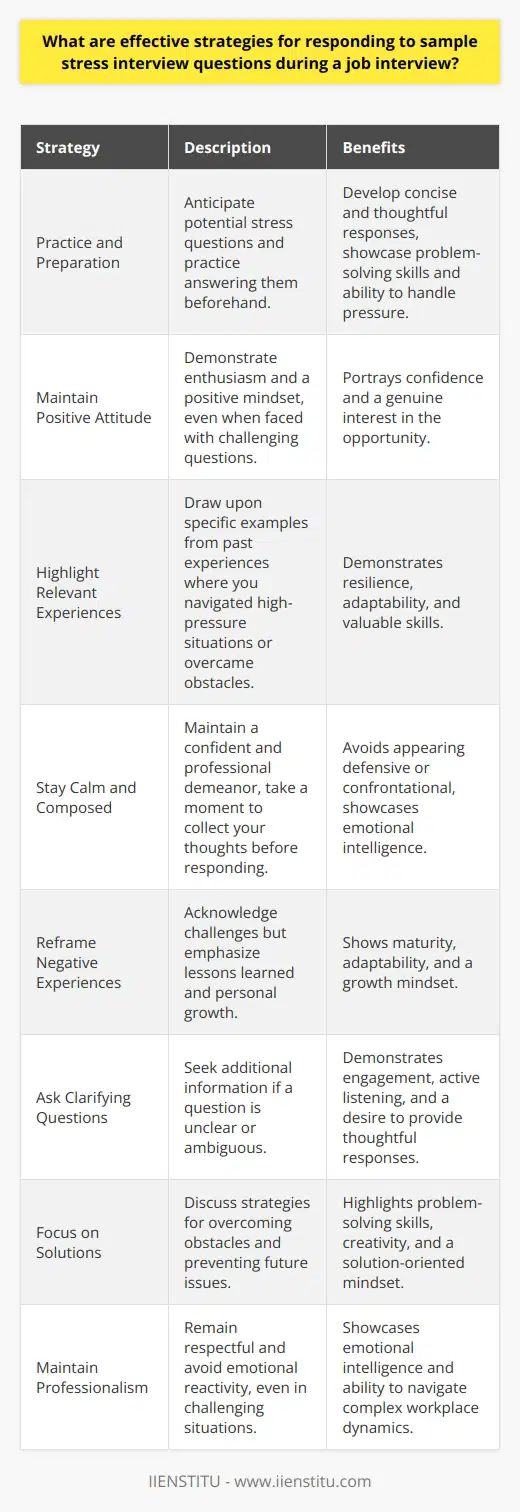
How do you cope with stress and pressure in your workplace?
Coping with stress and pressure in the workplace is crucial for maintaining productivity, mental well-being, and overall job satisfaction. Utilizing effective stress management techniques can help individuals navigate challenging work environments and prevent burnout. One key strategy is to prioritize tasks and manage time efficiently, ensuring that important responsibilities are handled promptly while avoiding procrastination. Engaging in regular physical exercise, such as yoga or cardiovascular activities, can also provide a healthy outlet for stress and promote relaxation.
Cultivating a Support System
Building a strong support system within the workplace is essential for managing stress and pressure effectively. Developing positive relationships with colleagues and supervisors can provide a network of emotional support and encouragement during challenging times. Openly communicating with team members about workload, deadlines, and expectations can help alleviate stress by fostering collaboration and understanding. Additionally, seeking guidance or mentorship from experienced colleagues can offer valuable insights and strategies for navigating stressful situations.
Maintaining Work-Life Balance
Achieving a healthy work-life balance is vital for reducing stress and preventing burnout in the workplace. Setting clear boundaries between work and personal life, such as establishing specific work hours and avoiding excessive overtime, can help maintain a sense of balance. Engaging in hobbies, spending quality time with loved ones, and pursuing personal interests outside of work can provide a necessary respite from job-related pressures. Taking regular breaks throughout the workday, even brief moments to stretch or practice deep breathing, can help refresh the mind and reduce stress levels.
Developing Resilience and Adaptability
Cultivating resilience and adaptability is crucial for coping with stress and pressure in the workplace. Embracing a growth mindset, viewing challenges as opportunities for learning and development, can help individuals approach stressful situations with a more positive outlook. Practicing mindfulness techniques, such as meditation or deep breathing exercises, can enhance emotional regulation and reduce anxiety. Developing effective problem-solving skills and learning to prioritize self-care, such as getting sufficient sleep and maintaining a healthy diet, can further bolster resilience in the face of work-related stress.
Seeking Professional Support
In situations where stress and pressure become overwhelming, seeking professional support can be a valuable step. Many workplaces offer employee assistance programs (EAPs) that provide confidential counseling services and resources for managing stress and mental health concerns. Consulting with a therapist or counselor can provide personalized strategies for coping with work-related stress and developing healthy coping mechanisms. Engaging in stress management workshops or training programs can also equip individuals with practical tools and techniques for navigating high-pressure work environments.
By implementing a combination of these strategies, individuals can effectively cope with stress and pressure in the workplace. Prioritizing self-care, building a supportive network, maintaining work-life balance, cultivating resilience, and seeking professional assistance when needed can all contribute to improved mental well-being and overall job satisfaction. By proactively managing stress and pressure, individuals can thrive in their careers and maintain a healthy, productive work environment.
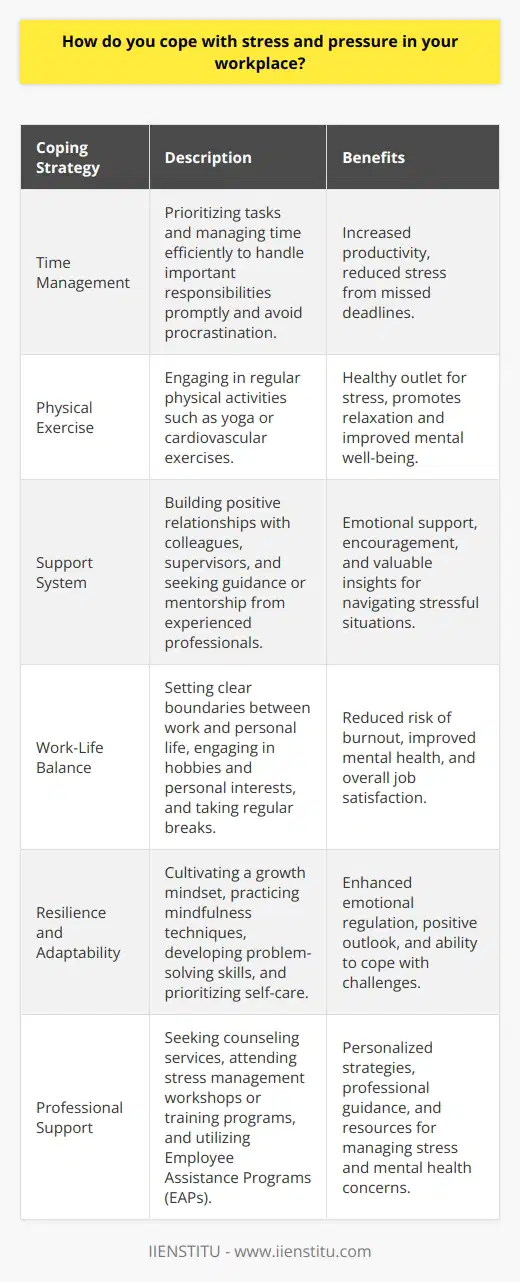
What strategies do you employ to manage stress and pressure in your professional life?
Managing stress and pressure in professional life is crucial for maintaining productivity, well-being, and overall job satisfaction. Implementing effective strategies can help individuals cope with demanding situations and prevent burnout. One key approach is prioritizing tasks and setting realistic goals to avoid feeling overwhelmed. Breaking down larger projects into smaller, manageable steps can make them less daunting and more achievable. Additionally, practicing time management techniques, such as using calendars, to-do lists, and scheduling breaks, can help optimize productivity and reduce stress.
Maintaining Work-Life Balance
Another essential strategy for managing stress and pressure is maintaining a healthy work-life balance. Setting clear boundaries between work and personal life can prevent work-related stress from spilling over into other areas. This includes establishing specific working hours, avoiding work-related tasks during off-hours, and dedicating time for hobbies, relaxation, and social activities. Engaging in regular physical exercise, such as jogging, yoga, or team sports, can also help reduce stress and improve overall well-being. Exercise releases endorphins, which are natural mood-boosters that can help combat the negative effects of stress.
Effective Communication and Support Systems
Effective communication is another crucial aspect of managing stress and pressure in the workplace. Open and honest communication with colleagues, supervisors, and subordinates can help clarify expectations, resolve conflicts, and foster a supportive work environment. Seeking guidance and support from mentors or trusted colleagues can provide valuable insights and help navigate challenging situations. Building a strong support system, both within and outside the workplace, can offer a sense of belonging and emotional support during stressful times.
Mindfulness and Relaxation Techniques
Incorporating mindfulness and relaxation techniques into daily routines can be highly effective in managing stress and pressure. Mindfulness practices, such as meditation and deep breathing exercises, can help reduce anxiety, improve focus, and promote a sense of calm. Taking short breaks throughout the day to practice these techniques can provide much-needed moments of relaxation and rejuvenation. Additionally, engaging in activities that bring joy and fulfillment, such as hobbies or volunteering, can help maintain a positive outlook and reduce stress levels.
Continuous Learning and Adaptability
Finally, embracing continuous learning and adaptability can help individuals manage stress and pressure in their professional lives. Staying updated with industry trends, acquiring new skills, and seeking opportunities for growth and development can boost confidence and resilience in the face of challenges. Cultivating a growth mindset, which views obstacles as opportunities for learning and improvement, can help reframe stressful situations in a more positive light. By adopting these strategies and maintaining a proactive approach to stress management, individuals can effectively navigate the demands of their professional lives while preserving their well-being and achieving long-term success.

In what ways do you deal with stressful situations and pressure at work?
Dealing with stressful situations and pressure at work is a common challenge faced by many professionals. There are various strategies and techniques that can be employed to effectively manage stress and maintain productivity in high-pressure work environments.
Prioritizing Tasks and Time Management
One of the most effective ways to deal with stress at work is through proper prioritization and time management. By creating a clear and organized task list, you can focus on the most important and time-sensitive tasks first. This helps to reduce feelings of being overwhelmed and ensures that deadlines are met.
Effective time management also involves setting realistic goals and breaking larger projects into smaller, manageable steps. This approach allows you to make steady progress and reduces the pressure associated with tackling large, complex tasks all at once.
Effective Communication and Delegation
Open and clear communication with colleagues and supervisors is crucial in managing stressful situations at work. By keeping lines of communication open, you can seek guidance, clarify expectations, and address any concerns or issues promptly.
Delegating tasks to team members or seeking assistance when necessary can also help alleviate stress. Recognizing your own limitations and knowing when to ask for help is a sign of strength and can prevent burnout.
Maintaining a Healthy Work-Life Balance
Achieving a healthy work-life balance is essential for managing stress and maintaining overall well-being. Setting clear boundaries between work and personal life can help prevent work-related stress from spilling over into other areas of your life.
Taking regular breaks throughout the workday, engaging in hobbies or activities outside of work, and prioritizing self-care are all important aspects of maintaining a healthy work-life balance.
Stress-Reduction Techniques
Incorporating stress-reduction techniques into your daily routine can help you better cope with pressure at work. Some effective techniques include deep breathing exercises, meditation, or engaging in physical activity.
These practices can help calm the mind, reduce tension, and improve overall mental and physical well-being, enabling you to approach stressful situations with greater clarity and resilience.
Building a Support Network
Developing a strong support network, both within and outside of work, can be incredibly valuable in managing stress. Connecting with colleagues who understand the challenges you face and can offer guidance or support can help you feel less isolated and more equipped to handle difficult situations.
Seeking support from friends, family, or even a professional counselor can provide an outlet for discussing your concerns and gaining new perspectives on how to cope with stress.
Continuous Learning and Adaptability
Embracing continuous learning and maintaining a flexible mindset can help you navigate stressful situations more effectively. By staying open to new ideas, acquiring new skills, and adapting to change, you can build resilience and confidence in your ability to handle challenges.
Regularly engaging in professional development opportunities, such as workshops, training sessions, or mentorship programs, can enhance your problem-solving skills and provide you with new tools and strategies for managing stress.
Conclusion
Dealing with stressful situations and pressure at work requires a proactive and multifaceted approach. By prioritizing tasks, communicating effectively, maintaining a healthy work-life balance, employing stress-reduction techniques, building a support network, and embracing continuous learning, you can develop the skills and resilience needed to thrive in high-pressure work environments.
Remember, managing stress is an ongoing process, and it is essential to be patient with yourself and consistently implement these strategies to maintain long-term well-being and success in your professional life.
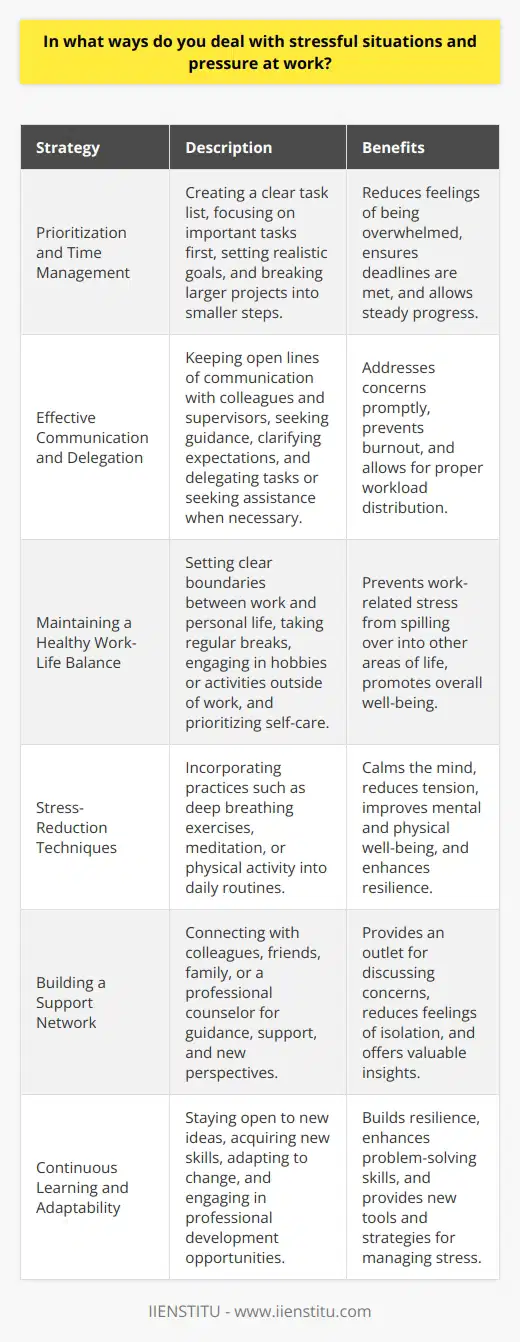
How do you handle stressful situations at work?
Handling stressful situations at work is a crucial skill for maintaining productivity and well-being. Several strategies can be employed to effectively manage stress in the workplace.
Identifying Stressors
The first step in managing stress is to identify the sources of stress. Take note of situations that trigger feelings of anxiety or overwhelm. By recognizing these stressors, you can develop targeted strategies to address them.
Common Workplace Stressors
Heavy workload and tight deadlines
Conflicts with colleagues or supervisors
Lack of control over work tasks
Insufficient resources or support
Developing Coping Mechanisms
Once you have identified the stressors, it's important to develop coping mechanisms. These techniques help you manage stress in the moment and prevent it from escalating.
Effective Coping Strategies
Practice deep breathing exercises to calm your mind and body
Take short breaks throughout the day to recharge
Prioritize tasks and focus on one thing at a time
Communicate openly with colleagues and supervisors about your workload and concerns
Building Resilience
Building resilience is key to handling stressful situations at work. Resilience refers to your ability to bounce back from challenges and adapt to change.
Strategies for Building Resilience
Maintain a positive attitude and focus on solutions rather than problems
Cultivate a support network of colleagues, friends, and family
Engage in regular exercise and maintain a healthy lifestyle
Practice mindfulness and relaxation techniques, such as meditation or yoga
Seeking Support
When stress becomes overwhelming, it's important to seek support. Don't hesitate to reach out to others for help and guidance.
Sources of Support
Talk to your supervisor or HR department about your concerns and explore potential solutions
Utilize employee assistance programs (EAPs) that offer counseling and support services
Seek advice from trusted colleagues who may have experienced similar challenges
Consider working with a therapist or counselor to develop personalized coping strategies
Maintaining Work-Life Balance
Maintaining a healthy work-life balance is crucial for managing stress. Make sure to set boundaries between your work and personal life.
Tips for Achieving Work-Life Balance
Set realistic goals and prioritize tasks to avoid overcommitting
Disconnect from work during off-hours and engage in hobbies or relaxation activities
Communicate your boundaries and expectations with colleagues and supervisors
Take time off when needed to recharge and avoid burnout
By implementing these strategies, you can effectively handle stressful situations at work. Remember, managing stress is an ongoing process that requires self-awareness, proactive coping mechanisms, and a commitment to self-care.
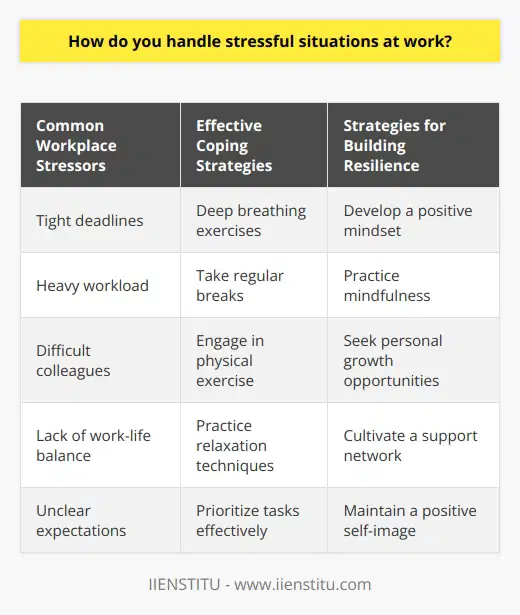
What are some effective strategies for managing stress in high-pressure environments?
Managing stress in high-pressure environments is crucial for maintaining well-being and optimizing performance. Several effective strategies can help individuals cope with stress in demanding situations.
Prioritizing Self-Care
One of the most important strategies for managing stress is prioritizing self-care. This involves taking care of your physical and mental health through regular exercise, a balanced diet, and sufficient sleep. Engaging in activities that promote relaxation, such as meditation, deep breathing exercises, or yoga, can also help reduce stress levels.
Setting Realistic Goals and Expectations
Setting realistic goals and expectations is another key strategy for managing stress. It's essential to break down large tasks into smaller, manageable steps and prioritize them based on importance and urgency. This approach can help prevent overwhelming feelings and reduce stress associated with looming deadlines or complex projects.
Effective Time Management
Effective time management is a critical component of stress management in high-pressure environments. Techniques such as the Pomodoro Technique, which involves working in focused 25-minute intervals followed by short breaks, can help maintain productivity while reducing stress. Additionally, learning to delegate tasks and saying "no" to non-essential commitments can help alleviate stress by preventing overload.
Building a Support Network
Building a strong support network is essential for managing stress in high-pressure situations. Surrounding yourself with supportive colleagues, friends, and family members can provide a sense of connection and encouragement during challenging times. Seeking guidance from mentors or professionals, such as counselors or coaches, can also offer valuable perspectives and coping strategies.
Practicing Mindfulness
Mindfulness is a powerful tool for managing stress in high-pressure environments. It involves focusing on the present moment and accepting thoughts and emotions without judgment. Incorporating mindfulness practices, such as deep breathing or guided meditations, can help reduce anxiety, improve focus, and promote a sense of calm amidst chaos.
Maintaining Work-Life Balance
Maintaining a healthy work-life balance is crucial for managing stress in high-pressure environments. Setting clear boundaries between work and personal life, such as establishing specific work hours and disconnecting from work-related tasks during leisure time, can help prevent burnout and reduce stress. Engaging in hobbies, spending time with loved ones, and taking regular breaks can also promote a sense of balance and well-being.
Embracing Flexibility and Adaptability
In high-pressure environments, unexpected challenges and changes are often inevitable. Embracing flexibility and adaptability can help reduce stress by enabling individuals to adjust their approach and mindset when faced with new circumstances. Cultivating a growth mindset, which views challenges as opportunities for learning and development, can also help reframe stressful situations in a more positive light.
By implementing these effective strategies, individuals can better manage stress in high-pressure environments, leading to improved well-being, enhanced performance, and greater overall success.
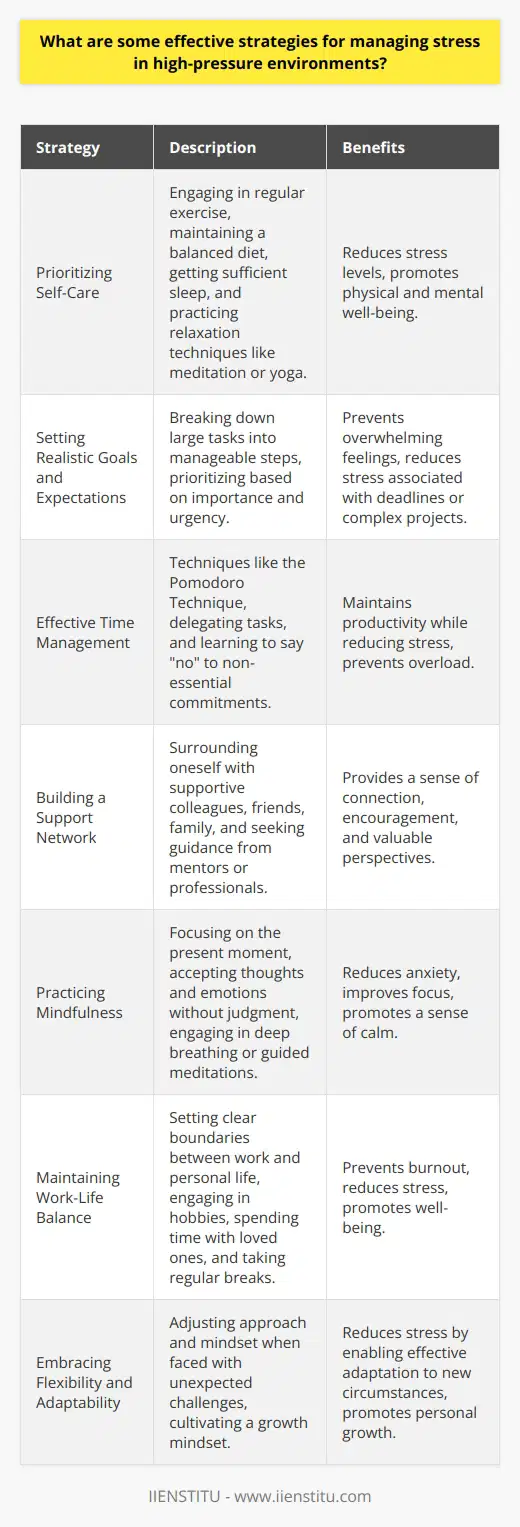
How can one maintain a positive attitude and mental well-being during stressful times?
Maintaining a positive attitude and mental well-being during stressful times is crucial for overall health and happiness. One effective way to achieve this is by practicing mindfulness and staying present in the moment. Mindfulness involves focusing on the present, acknowledging thoughts and feelings without judgment, and letting them pass. Engaging in mindfulness exercises, such as deep breathing or meditation, can help reduce stress and promote a sense of calm.
The Power of Positive Self-Talk
Another key strategy for maintaining a positive attitude is to engage in positive self-talk. The way we speak to ourselves has a significant impact on our mental well-being. By consciously replacing negative thoughts with positive ones, we can reframe our perspective and boost our mood. Instead of focusing on what's going wrong, try to identify the things you're grateful for and the progress you've made.
Cultivating Resilience Through Challenges
Resilience is the ability to bounce back from adversity and adapt to change. Cultivating resilience is essential for maintaining mental well-being during stressful times. One way to build resilience is to view challenges as opportunities for growth and learning. Embrace the idea that setbacks are temporary and that you have the strength to overcome them. Celebrate your successes, no matter how small, and learn from your mistakes.
The Importance of Self-Care
Engaging in regular self-care activities is another effective way to maintain a positive attitude and mental well-being. Self-care involves taking intentional actions to nurture your physical, emotional, and mental health. This can include activities such as exercising, getting enough sleep, eating a balanced diet, and engaging in hobbies or interests that bring you joy. By prioritizing self-care, you're sending a message to yourself that your well-being matters and deserves attention.
Building a Support System
Having a strong support system is crucial for maintaining mental well-being during stressful times. Surround yourself with positive, supportive people who uplift and encourage you. Don't be afraid to reach out for help when you need it, whether it's to a trusted friend, family member, or mental health professional. Talking about your feelings and concerns can provide a sense of relief and help you gain new perspectives.
Practicing Gratitude
Cultivating a practice of gratitude can significantly improve mental well-being and promote a positive attitude. Take time each day to reflect on the things you're thankful for, no matter how big or small. Keep a gratitude journal, where you write down a few things you appreciate each day. Focusing on the positive aspects of life can help shift your mindset and provide a buffer against stress.
Seeking Professional Help
If you find that stress is significantly impacting your mental well-being, don't hesitate to seek professional help. Mental health professionals, such as therapists or counselors, can provide valuable support and guidance during challenging times. They can help you develop coping strategies, work through difficult emotions, and build resilience. Remember, seeking help is a sign of strength, not weakness.
By incorporating these strategies into daily life, one can maintain a positive attitude and mental well-being, even during stressful times. Remember, it's okay to not be okay, and it's important to prioritize your mental health. Be kind to yourself, practice self-compassion, and know that you have the strength to navigate through challenges. With a commitment to self-care, positive self-talk, and building resilience, you can cultivate a more positive outlook and enhance your overall well-being.
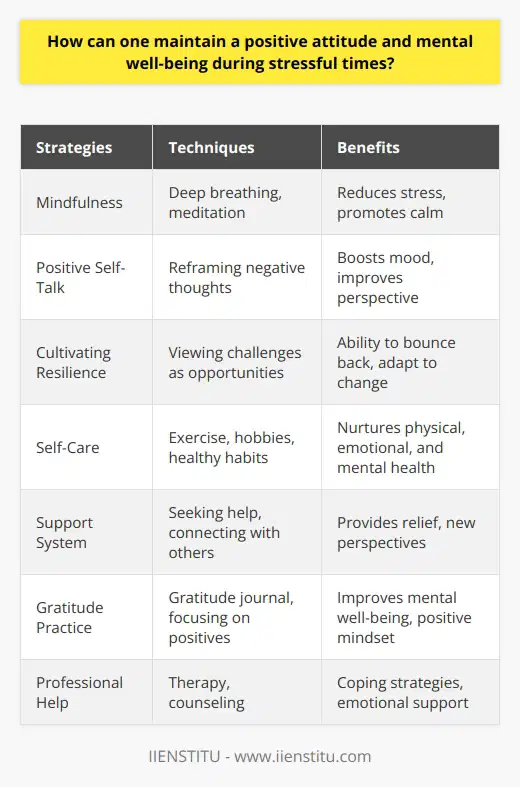
How do you handle stress and pressure in the workplace?
Stress and pressure are an inevitable part of any job. I've certainly felt my fair share of it over the years! While a little bit of stress can sometimes be motivating, too much can quickly lead to burnout, health problems, and poor performance at work. Through trial and error, I've discovered some key strategies that help me manage workplace stress effectively.
Prioritize and Focus on What Matters Most
One of the biggest sources of my stress has always been feeling overwhelmed by a massive to-do list. Everything feels important and urgent! What helps is taking a step back, looking at the big picture, and ruthlessly prioritizing. I zero in on the tasks and projects that will have the biggest impact or that absolutely must get done. The rest can wait. I've learned that trying to do too many things at once is a recipe for stress and subpar work.
Take Breaks to Recharge
When the pressure is on, my instinct is often to work longer and harder. But I've found that's usually counterproductive. We all need time to mentally recharge. For me, that means taking a quick walk outside, chatting with a coworker about a non-work topic, or simply closing my eyes and doing some deep breathing at my desk. Even a 10-minute break does wonders for my stress levels and ability to think clearly. Don't be afraid to step away for a bit!
Set Boundaries and Realistic Expectations
In my eagerness to please everyone, I used to have a hard time saying no to requests. My plate would get fuller and fuller until I reached my breaking point. I've gotten much better at (politely) declining projects that I realistically don't have the bandwidth for. I'm also upfront about timelines - if I know something will take 2 weeks instead of 2 days, I say so. Most people appreciate the honesty and would rather have quality work than a stressed-out colleague!
Lean on Your Support System
For me, one of the best antidotes to stress is human connection. When I'm feeling overwhelmed, I reach out to a trusted coworker, friend, or family member. Just talking through what's on my mind and getting some outside perspective is so helpful. At one particularly stressful point in my career, I worked with a professional counselor for a few months. It made a huge difference in my ability to cope with pressure constructively.
Remember the Big Picture
When I'm deep in the weeds of a stressful project, it's easy to lose sight of what really matters. I have to actively remind myself that my job is just one part of my life, not my whole identity. Work stress is temporary - it will pass. And odds are, whatever I'm stressing about isn't nearly as make-or-break as it feels in the moment. Keeping things in perspective helps me stay grounded.
At the end of the day, stress is a part of any meaningful career. But it doesn't have to overwhelm us. By prioritizing, setting boundaries, recharging, reaching out for support, and keeping the big picture in mind, we can keep stress at a manageable level. We've got this!
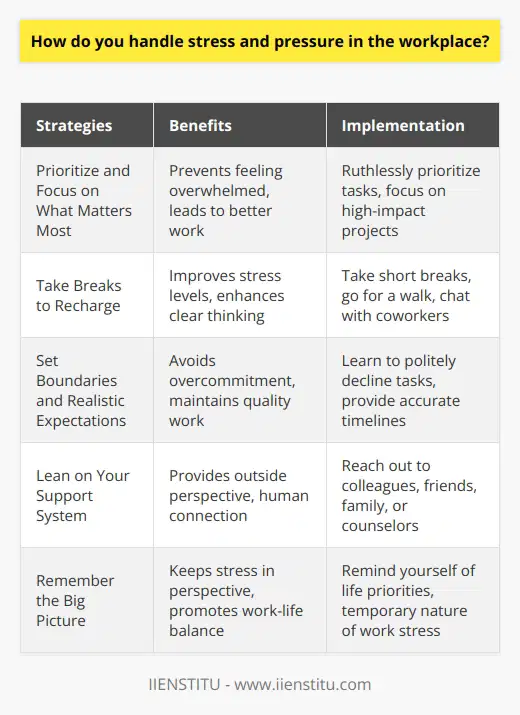
What strategies do you employ to effectively manage stress and pressure?
Managing stress and pressure effectively is crucial for maintaining mental well-being and achieving success in various aspects of life. I have discovered several strategies that help me cope with stressful situations and keep my composure under pressure.
Prioritizing Self-Care
One of the most important strategies I employ is prioritizing self-care. When stress levels rise, it's easy to neglect our basic needs, but I make a conscious effort to take care of myself. I ensure that I get enough sleep, eat nutritious meals, and engage in regular physical exercise.
I find that setting aside time for hobbies and activities I enjoy, such as reading, painting, or playing music, helps me unwind and recharge. These moments of self-care act as a buffer against stress and remind me to focus on my well-being.
Practicing Mindfulness
Another effective strategy I use is practicing mindfulness. Mindfulness involves being present in the moment and observing my thoughts and emotions without judgment. When I feel overwhelmed, I take a few minutes to engage in deep breathing exercises or meditation.
By focusing on my breath and bringing my attention to the present, I can calm my mind and gain a clearer perspective on the situation at hand. Mindfulness helps me avoid getting caught up in worries about the future or regrets about the past, allowing me to approach challenges with a more balanced mindset.
Breaking Tasks into Manageable Steps
When faced with a daunting task or project, I find it helpful to break it down into smaller, manageable steps. Instead of getting overwhelmed by the enormity of the challenge, I create a plan of action and tackle one step at a time.
By focusing on making progress, even if it's small, I build momentum and confidence. Celebrating each milestone along the way helps me stay motivated and reduces the pressure I put on myself.
Seeking Support
I have learned that it's essential to reach out for support when dealing with stress and pressure. I am fortunate to have a network of family, friends, and colleagues who I can turn to for guidance, encouragement, and a listening ear.
Talking about my concerns and challenges with someone I trust helps me gain new perspectives and reduces feelings of isolation. Knowing that I have a support system gives me the strength to face difficult situations and reminds me that I am not alone.
Maintaining a Positive Outlook
Finally, I strive to maintain a positive outlook, even in the face of adversity. I actively challenge negative self-talk and reframe setbacks as opportunities for growth and learning. By focusing on the things I can control and letting go of what I cannot, I reduce the amount of stress I experience.
I find inspiration in the stories of others who have overcome challenges and use their examples as motivation to persevere. Cultivating gratitude for the good things in my life, no matter how small, helps me maintain a balanced perspective and keeps stress in check.
Managing stress and pressure is an ongoing process, and what works for one person may not work for another. By experimenting with different strategies and finding what resonates with me, I have developed a toolkit for navigating stressful situations with greater resilience and adaptability.
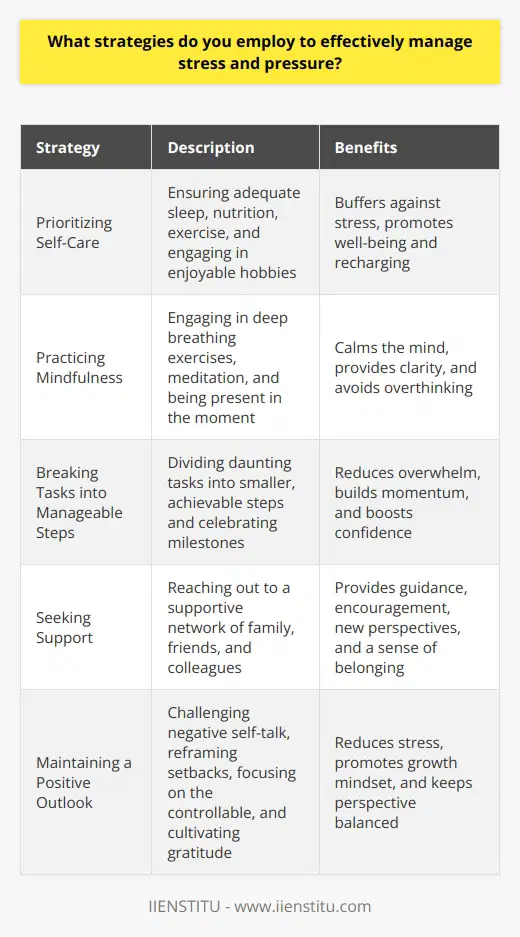
In what ways do you cope with and mitigate the effects of stress and pressure?
Coping with stress and pressure is a crucial skill in today's fast-paced world. As a college student, I've experienced my fair share of stress, from looming deadlines to personal challenges. Over time, I've developed several strategies to mitigate its effects and maintain my well-being.
Prioritizing Self-Care
One of the most important ways I cope with stress is by prioritizing self-care. This means making time for activities that nourish my body and mind, even when I feel overwhelmed. For me, this includes regular exercise, whether it's a jog around campus or a yoga class at the gym. Physical activity helps me release tension and boost my mood.
I also make sure to get enough sleep, aiming for 7-8 hours per night. When I'm well-rested, I'm better equipped to handle stress and think clearly. Additionally, I try to eat a balanced diet, with plenty of fruits, vegetables, and whole grains. Proper nutrition fuels my body and brain, helping me stay focused and energized.
Practicing Mindfulness
Another key strategy I use to manage stress is practicing mindfulness. This involves being present in the moment and observing my thoughts and feelings without judgment. When I feel overwhelmed, I take a few minutes to sit quietly and focus on my breath. This simple act of mindfulness helps me center myself and gain perspective.
I also find journaling to be a powerful mindfulness tool. Writing down my thoughts and emotions allows me to process them in a healthy way. It's a cathartic exercise that helps me identify patterns and work through challenges. Sometimes, just putting pen to paper can make a problem seem more manageable.
Seeking Support
In times of high stress, I've learned the importance of seeking support from others. This can mean reaching out to friends and family, or even seeking professional help if needed. Talking through my concerns with a trusted confidant can provide a fresh perspective and help me feel less alone.
On campus, I've also taken advantage of resources like counseling services and support groups. These safe spaces allow me to connect with others who may be going through similar challenges. Knowing that I'm not the only one struggling can be incredibly comforting and empowering.
Maintaining Balance
Finally, I try to maintain a sense of balance in my life, even when stress feels all-consuming. This means setting realistic goals and expectations for myself, and learning to say "no" when necessary. I prioritize my commitments and focus on what truly matters, rather than spreading myself too thin.
I also make time for hobbies and activities that bring me joy, like playing music or exploring nature. These moments of respite help me recharge and approach challenges with a clearer mind. By maintaining a balanced lifestyle, I'm better able to weather the storms of stress and pressure.
In conclusion, coping with stress and pressure is an ongoing process that requires self-awareness, self-care, and support. By prioritizing my well-being, practicing mindfulness, seeking help when needed, and maintaining balance, I've learned to navigate even the most challenging times. These strategies have not only helped me succeed academically but have also contributed to my overall growth and resilience as a person.
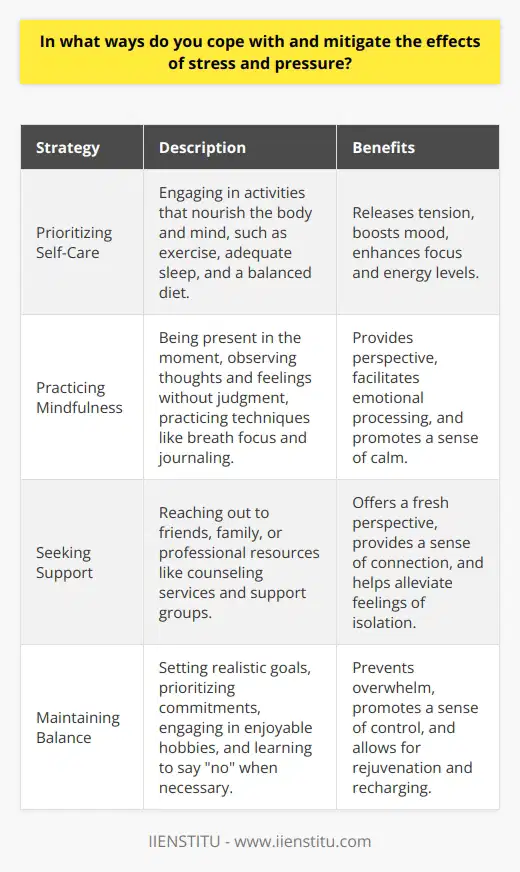
What activities or techniques do you find most effective in helping you relax during stressful times?
During stressful times, finding effective ways to relax and unwind is crucial for maintaining mental and physical well-being. Personally, I have discovered several activities and techniques that help me manage stress and find inner peace amidst the chaos of daily life.
Mindfulness Meditation
One of the most powerful tools in my relaxation arsenal is mindfulness meditation. By taking a few minutes each day to sit quietly, focus on my breath, and observe my thoughts without judgment, I find that I can cultivate a sense of calm and clarity. Mindfulness helps me to stay grounded in the present moment, rather than getting caught up in worries about the future or regrets about the past.
I remember a particularly stressful period in my life when I was juggling multiple deadlines at work and dealing with family issues. By incorporating mindfulness meditation into my daily routine, even just for 10-15 minutes a day, I found that I was able to approach challenges with a clearer mind and a more positive outlook.
Nature Walks
Another activity that I find incredibly soothing is taking nature walks. There's something about being surrounded by the beauty of the natural world that helps me to put my troubles into perspective. Whether it's a stroll through a nearby park or a hike in the mountains, immersing myself in nature allows me to disconnect from the stresses of daily life and reconnect with a sense of peace and wonder.
One of my favorite memories is of a weekend camping trip I took with friends during a particularly hectic time in my life. As we hiked through the forest and sat around the campfire at night, I felt my stress melting away and a renewed sense of joy and contentment taking its place.
Creative Hobbies
Engaging in creative hobbies is another way that I find relief during stressful times. Whether it's painting, writing, or playing music, losing myself in a creative pursuit allows me to express my emotions and find a sense of flow and relaxation. When I'm focused on creating something, my mind is too busy to dwell on the sources of my stress.
I recall a time when I was going through a difficult breakup and found solace in writing poetry. Pouring my heart onto the page helped me to process my feelings and find a sense of catharsis and healing.
Physical Exercise
Finally, I find that physical exercise is a powerful stress-buster. Whether it's going for a run, practicing yoga, or dancing around my living room, getting my body moving helps to release tension and boost my mood. Exercise also helps to improve my sleep quality, which is essential for managing stress.
I remember a time when I was studying for a big exam and feeling overwhelmed by the amount of material I needed to learn. By taking breaks to go for short runs or do some yoga stretches, I was able to maintain my focus and energy levels throughout my studying.
In conclusion, these are just a few of the activities and techniques that I find most effective for relaxing during stressful times. By incorporating mindfulness, nature, creativity, and physical exercise into my life, I am better equipped to weather life's storms and find moments of peace and joy along the way.

Can you provide some examples of how you manage stress and maintain a sense of calm in high-pressure situations?
Managing stress and maintaining composure in high-pressure situations is a skill that can be developed over time. Through personal experience and observation, I have found several effective strategies that help me stay calm and focused when the pressure is on.
Prioritizing Self-Care
One of the most important things I do to manage stress is to prioritize self-care. This means taking care of my physical, mental, and emotional well-being on a regular basis. I make sure to get enough sleep, eat a healthy diet, and exercise regularly. These habits help me feel more energized, resilient, and better equipped to handle challenges.
I also practice mindfulness and meditation, which have been game-changers for me. Taking a few minutes each day to focus on my breath and be present in the moment helps me feel more centered and grounded. When I'm in a high-pressure situation, I can draw on this sense of inner calm to stay focused and composed.
Breaking Down Tasks
Another strategy I use is breaking down tasks into smaller, more manageable steps. When I'm facing a daunting project or deadline, it's easy to feel overwhelmed and stressed out. However, by breaking the task down into smaller chunks and tackling them one at a time, I feel more in control and less anxious.
For example, when I was working on a big presentation for work, I felt really stressed about getting everything done in time. Instead of trying to do it all at once, I broke it down into smaller tasks like researching, outlining, creating slides, and practicing my delivery. By focusing on one step at a time, I was able to stay calm and avoid getting overwhelmed.
Seeking Support
Finally, I've learned that it's okay to seek support when I'm feeling stressed or overwhelmed. Whether it's talking to a trusted friend or colleague, or seeking help from a mental health professional, having a support system can make a big difference.
I remember a time when I was going through a particularly stressful period at work. I was working long hours and feeling burned out, but I was hesitant to reach out for help. Eventually, I confided in a coworker who had gone through something similar, and she was able to offer some great advice and support. Just knowing that I wasn't alone and that others had gone through similar challenges helped me feel more resilient and capable of handling the stress.
Conclusion
Managing stress and maintaining calm in high-pressure situations is an ongoing process that requires practice and self-awareness. By prioritizing self-care, breaking down tasks, and seeking support when needed, I've been able to develop greater resilience and composure in the face of challenges. While stress is an inevitable part of life, I believe that with the right strategies and mindset, it's possible to navigate even the most high-pressure situations with grace and confidence.

In your experience, what are some of the best ways to unwind and recharge when faced with stressful circumstances?
As a college student, I've experienced my fair share of stressful situations. From juggling multiple assignments to dealing with personal challenges, it's easy to feel overwhelmed and drained. However, over time, I've discovered some effective ways to unwind and recharge when faced with these circumstances.
Take a Break and Engage in Physical Activity
One of the best ways to combat stress is to step away from the source of your stress and engage in physical activity. Whether it's going for a run, practicing yoga, or playing a sport, getting your body moving can help release endorphins and reduce tension. I personally find that a quick jog around campus or a swim in the university pool can do wonders for my mental state.
Exercise not only provides a much-needed distraction from stressful thoughts but also helps improve overall well-being. It boosts energy levels, enhances focus, and promotes better sleep, all of which contribute to a more resilient and positive mindset.
Connect with Nature
Another powerful way to unwind is to spend time in nature. Being surrounded by greenery, fresh air, and natural beauty can have a calming effect on the mind and body. Whenever I feel stressed, I make it a point to take a walk in the nearby park or simply sit outside and soak in the sun.
Nature has a way of putting things into perspective and reminding us of the bigger picture. It helps us disconnect from the constant buzz of technology and the demands of daily life, allowing us to find a sense of peace and tranquility.
Practice Mindfulness and Relaxation Techniques
Mindfulness and relaxation techniques are powerful tools for managing stress. Taking a few minutes each day to practice deep breathing, meditation, or progressive muscle relaxation can help calm the mind and reduce anxiety. I've found that incorporating these practices into my daily routine has made a significant difference in my ability to handle stress.
When I'm feeling particularly overwhelmed, I like to find a quiet space, close my eyes, and focus on my breath. By bringing my attention to the present moment and letting go of worrying thoughts, I'm able to find a sense of inner peace and clarity.
Engage in Hobbies and Creative Pursuits
Engaging in hobbies and creative pursuits is another excellent way to unwind and recharge. Whether it's painting, playing music, writing, or crafting, immersing yourself in an activity you enjoy can provide a much-needed break from stress.
For me, playing the guitar has always been a great outlet. Whenever I'm feeling stressed, I pick up my instrument and lose myself in the music. It allows me to express myself creatively and forget about my worries for a while.
Connect with Others
Finally, connecting with others can be a powerful way to cope with stress. Talking to friends, family, or even a therapist can provide a sense of support and perspective. It's important to remember that you don't have to face your challenges alone.
I've found that sharing my struggles with trusted friends and loved ones can be incredibly cathartic. Simply knowing that someone understands and cares can make a world of difference in how I feel.
In conclusion, unwinding and recharging in the face of stress is crucial for maintaining mental and physical well-being. By engaging in physical activity, connecting with nature, practicing mindfulness, pursuing hobbies, and reaching out to others, we can build resilience and find healthy ways to cope with the challenges of life.

What do you do to relax during stressful times?
During stressful times, it's crucial to have effective relaxation techniques to maintain mental and physical well-being. Engaging in activities that promote relaxation can help reduce the negative impact of stress on our lives. Here are some personal experiences and insights on what I do to relax during stressful times.
Engaging in Physical Exercise
One of my go-to methods for relaxation is physical exercise. Whenever I feel overwhelmed by stress, I make it a point to engage in some form of physical activity. Whether it's going for a brisk walk in nature, practicing yoga, or hitting the gym, I find that exercise helps me clear my mind and release pent-up tension in my body.
I remember a particularly stressful period in my life when I was juggling multiple deadlines at work. I made a commitment to start each day with a 30-minute jog in the nearby park. As I ran, I focused on my breathing and the beautiful surroundings, allowing myself to be present in the moment. The combination of physical exertion and being in nature worked wonders for reducing my stress levels and giving me a fresh perspective to tackle the day ahead.
The Benefits of Exercise for Relaxation
Exercise has been scientifically proven to have numerous benefits for relaxation and stress reduction. When we engage in physical activity, our bodies release endorphins, which are natural mood-boosters. These endorphins help counteract the negative effects of stress hormones like cortisol, leaving us feeling more relaxed and positive.
Moreover, exercise provides a healthy distraction from stressful thoughts and worries. When we focus on the physical sensations of movement and breathing, our minds get a much-needed break from the constant chatter of stress and anxiety. This mental break allows us to approach our stressors with a clearer and more balanced mindset.
Practicing Mindfulness and Meditation
Another effective relaxation technique that I regularly practice is mindfulness and meditation. In today's fast-paced world, it's easy to get caught up in the constant stream of thoughts and worries. Mindfulness helps me slow down, be present in the moment, and cultivate a sense of inner peace.
I started my mindfulness journey by dedicating just 10 minutes each day to a simple meditation practice. I found a quiet space, sat comfortably, and focused on my breath. Whenever my mind wandered (which it did frequently at first), I gently redirected my attention back to my breath. Over time, I noticed that my ability to stay present and calm improved, even in the face of stress.
The Power of Mindfulness for Stress Reduction
Mindfulness has gained significant attention in recent years for its remarkable benefits in stress reduction. By practicing mindfulness, we train our minds to observe our thoughts and emotions without getting caught up in them. We learn to respond to stress with greater clarity and resilience, rather than reacting impulsively.
Research has shown that regular mindfulness practice can lead to reduced levels of stress, anxiety, and depression. It can also enhance our overall well-being by improving sleep quality, boosting immune function, and increasing our capacity for compassion and empathy.
Engaging in Hobbies and Creative Pursuits
Another way I relax during stressful times is by engaging in hobbies and creative pursuits. When I immerse myself in activities that I genuinely enjoy, I find that my stress levels naturally decrease, and I experience a greater sense of fulfillment and joy.
For me, writing has always been a therapeutic outlet. Whenever I feel stressed, I take out my journal and pour my thoughts and emotions onto the pages. The act of expressing myself through words helps me process my experiences and gain a fresh perspective. Other creative pursuits like painting, playing music, or crafting can also provide a much-needed escape from stress and allow us to tap into our inner creativity.
The Importance of Hobbies for Stress Relief
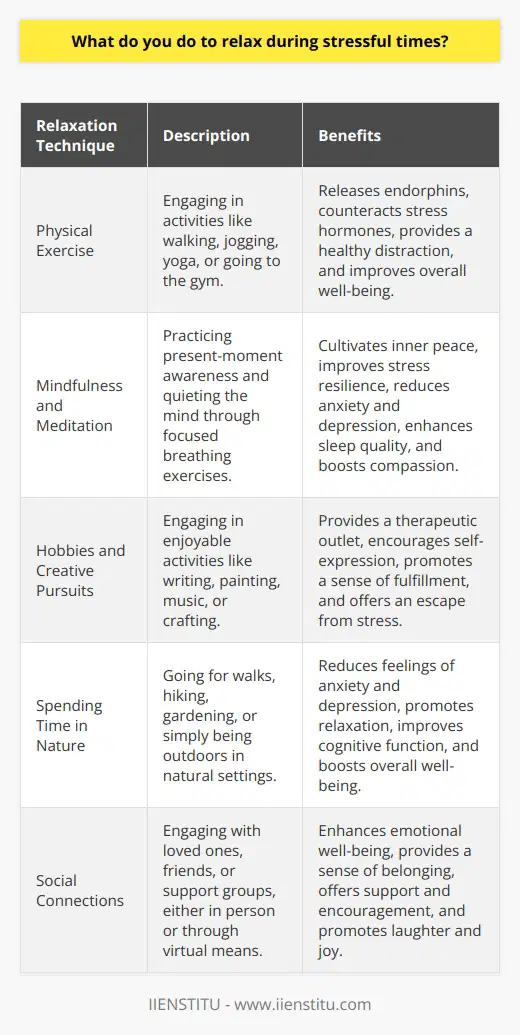
How do you manage stress and maintain a healthy work-life balance?
Managing stress and maintaining a healthy work-life balance is crucial for overall well-being and productivity. It requires a proactive approach and a commitment to prioritizing self-care. Here are some strategies that can help:
Set Boundaries and Stick to Them
One of the most important things you can do is to set clear boundaries between work and personal life. This means establishing specific work hours and sticking to them as much as possible. It also means learning to say no to extra work or commitments that will interfere with your personal time.
I remember a time when I was working on a big project and felt pressure to work long hours. I had to remind myself that my health and relationships were important too. I set a hard stop time each day and communicated this to my team. It wasn't always easy, but it helped me avoid burnout.
Practice Mindfulness and Relaxation Techniques
Mindfulness and relaxation techniques can be powerful tools for managing stress. This can include things like deep breathing, meditation, yoga, or even just taking a few minutes to sit quietly and focus on the present moment.
Personally, I find that taking a few deep breaths and doing a quick body scan can help me feel more centered and less overwhelmed. It's a simple practice, but it makes a big difference in my stress levels.
Prioritize Self-Care
Self-care is essential for maintaining a healthy work-life balance. This means making time for activities that nourish your body, mind, and soul. It could be exercise, hobbies, spending time with loved ones, or anything else that brings you joy and relaxation.
For me, going for a run or hike in nature is a great way to de-stress and recharge. I also make sure to schedule regular social activities with friends and family, even if it's just a quick coffee date or phone call.
Create a Support System
Having a strong support system can make a big difference in managing stress and maintaining balance. This could include family, friends, coworkers, or even a therapist or coach. Don't be afraid to reach out for help when you need it.
I'm grateful to have a few close friends who I can always count on for a listening ear or words of encouragement. Knowing that I have people in my corner helps me feel less alone and more resilient in the face of stress.
Practice Time Management
Effective time management is key to maintaining a healthy work-life balance. This means prioritizing tasks, breaking big projects into smaller steps, and learning to delegate when appropriate. It also means being realistic about what you can accomplish in a day and not overcommitting yourself.
One strategy that works well for me is the Pomodoro Technique, where I work in focused 25-minute intervals with short breaks in between. This helps me stay on task and avoid getting overwhelmed by my to-do list.
Conclusion
Managing stress and maintaining a healthy work-life balance is an ongoing process that requires intentional effort and self-awareness. By setting boundaries, practicing mindfulness and self-care, creating a support system, and managing your time effectively, you can reduce stress and find greater harmony between your work and personal life. Remember, it's okay to prioritize your own well-being – in fact, it's essential for long-term success and happiness.

How do you typically respond when faced with a stressful situation?
When faced with a stressful situation, I typically respond by taking a moment to assess the situation objectively. I find that taking a step back and evaluating the source of the stress helps me gain perspective. This allows me to identify the root cause of the problem and formulate a plan of action.
Identifying the Stressors
The first step in managing stress is to identify the specific factors contributing to the stressful situation. I ask myself questions like, "What exactly is causing me to feel overwhelmed or anxious?" By pinpointing the stressors, I can better understand the nature of the challenge and begin to develop strategies to address it.
Prioritizing Tasks
Once I have identified the stressors, I prioritize the tasks or issues that need to be addressed. I focus on the most pressing matters first and break them down into smaller, manageable steps. This helps me feel more in control and reduces the overall sense of overwhelm.
Seeking Support
In stressful situations, I have learned the importance of seeking support from others. I reach out to trusted friends, family members, or colleagues who can offer guidance, encouragement, or a fresh perspective. Talking through my concerns with someone I trust often helps me gain clarity and reduces the emotional burden.
Practicing Self-Care
I have found that practicing self-care is crucial in managing stress. When faced with a challenging situation, I make sure to take care of my physical and emotional well-being. This includes engaging in activities that help me relax and recharge, such as exercising, practicing mindfulness, or pursuing hobbies I enjoy.
Maintaining a Positive Outlook
I try to maintain a positive outlook even in the face of stress. I remind myself that challenges are temporary and that I have the resilience and resources to overcome them. Focusing on the potential opportunities for growth and learning helps me reframe the situation in a more constructive light.
Taking Action
Once I have assessed the situation, prioritized tasks, sought support, and practiced self-care, I take action to address the stressors head-on. I break down the problem into smaller, achievable steps and tackle them one at a time. Celebrating small victories along the way helps me maintain momentum and motivation.
Learning from Experience
After navigating a stressful situation, I take time to reflect on the experience and identify any lessons learned. I ask myself, "What worked well in managing this stress? What could I have done differently?" By learning from each experience, I can refine my stress management strategies and be better prepared for future challenges.
It's important to remember that everyone responds to stress differently, and what works for one person may not work for another. The key is to develop a personalized toolkit of stress management techniques that resonate with you. By proactively identifying stressors, seeking support, practicing self-care, maintaining a positive outlook, and taking action, you can build resilience and effectively navigate stressful situations.

What strategies do you employ to manage stress effectively in challenging circumstances?
When faced with challenging circumstances, it's crucial to have effective strategies in place to manage stress. Over the years, I've developed a few tried-and-true methods that help me stay calm and focused, even when things get tough.
Prioritize Self-Care
One of the most important things I do to manage stress is to prioritize self-care. This means taking time each day to do something that nourishes my body, mind, or spirit. Whether it's going for a run, practicing yoga, or simply taking a few minutes to meditate, I find that carving out time for myself helps me feel more centered and resilient.
I remember a particularly stressful period in my life when I was juggling a demanding job and caring for a sick family member. It was easy to let self-care fall by the wayside, but I quickly realized that neglecting my own needs only made things worse. By committing to even just a few minutes of self-care each day, I was able to manage my stress more effectively and show up as my best self for those who needed me.
Practice Mindfulness
Another strategy I rely on is mindfulness. When stress levels are high, it's easy to get caught up in worry and anxiety about the future. Mindfulness helps me stay grounded in the present moment and approach challenges with a clear head.
One simple mindfulness technique I use is to focus on my breath. Whenever I feel overwhelmed, I take a few deep breaths and pay attention to the sensation of the air moving in and out of my lungs. This helps me quiet my mind and find a sense of calm, even in the midst of chaos.
Lean on Support Systems
Finally, I've learned the importance of leaning on my support systems during times of stress. This might mean reaching out to a trusted friend or family member for a listening ear, or seeking the guidance of a therapist or counselor.
I've found that simply talking through my stressors with someone I trust can be incredibly helpful. It allows me to process my emotions, gain new perspectives, and feel less alone in my struggles. Plus, knowing that I have people in my corner who I can turn to for support gives me a sense of security and resilience.
Conclusion
Managing stress effectively is an ongoing process, and what works for one person might not work for another. However, by prioritizing self-care, practicing mindfulness, and leaning on support systems, I've found that I'm better equipped to handle whatever challenges come my way. It's not always easy, but with these strategies in my toolkit, I feel more confident and capable of navigating even the toughest of circumstances.
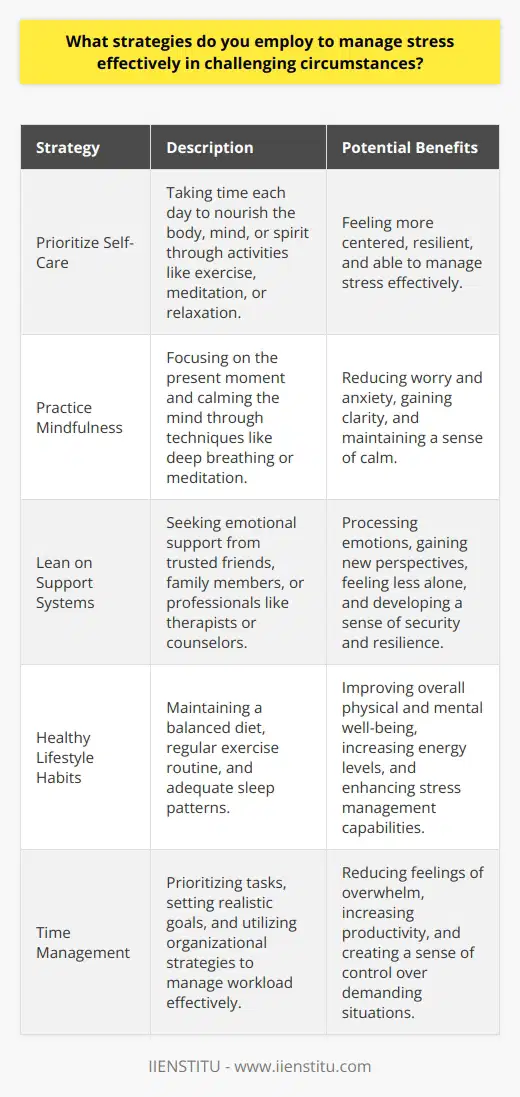
In what ways do you maintain composure and focus when dealing with high-pressure situations?
When faced with high-pressure situations, maintaining composure and focus is crucial for success. Over the years, I've developed several strategies to help me stay calm and centered, even in the most challenging circumstances.
Practice Mindfulness
One of the most effective ways I've found to maintain composure is through the practice of mindfulness. By focusing on the present moment and being aware of my thoughts and feelings, I can better manage stress and anxiety. Mindfulness techniques such as deep breathing, meditation, and yoga have been invaluable tools in my arsenal.
I remember a particularly stressful period in my life when I was juggling multiple deadlines at work while also dealing with personal challenges. By setting aside time each day for mindfulness practice, I was able to find a sense of inner calm and clarity that helped me navigate through the chaos.
Prepare and Plan Ahead
Another key strategy I use to maintain focus in high-pressure situations is thorough preparation and planning. By breaking down complex tasks into manageable steps and creating a clear roadmap, I feel more in control and less overwhelmed.
For example, when I was tasked with delivering a crucial presentation to a group of executives, I spent weeks researching, outlining, and rehearsing my material. By the time the big day arrived, I felt confident and well-prepared, which allowed me to stay focused and deliver a successful presentation.
Lean on Support Systems
In times of high pressure, it's essential to have a strong support system to lean on. Whether it's family, friends, colleagues, or a professional mentor, having people to turn to for guidance, encouragement, and a listening ear can make all the difference.
I'm grateful for the incredible support network I've built over the years. From my spouse who always has my back, to my trusted colleagues who offer valuable insights and perspective, knowing that I have people in my corner helps me maintain composure and stay focused on my goals.
Embrace Challenges as Opportunities
Finally, I've learned to reframe high-pressure situations as opportunities for growth and learning. Instead of viewing them as threats or obstacles, I try to approach challenges with a positive mindset and a willingness to adapt and innovate.
This shift in perspective has been game-changing for me. When I was passed over for a promotion I had been working towards, instead of getting discouraged, I used it as a chance to reassess my skills and identify areas for improvement. By embracing the challenge as an opportunity, I was able to maintain my composure, stay focused on my goals, and ultimately achieve even greater success down the line.
In conclusion, maintaining composure and focus in high-pressure situations is a skill that can be developed and strengthened over time. By practicing mindfulness, preparing and planning ahead, leaning on support systems, and embracing challenges as opportunities, we can cultivate the resilience and mental fortitude needed to thrive in even the toughest circumstances.
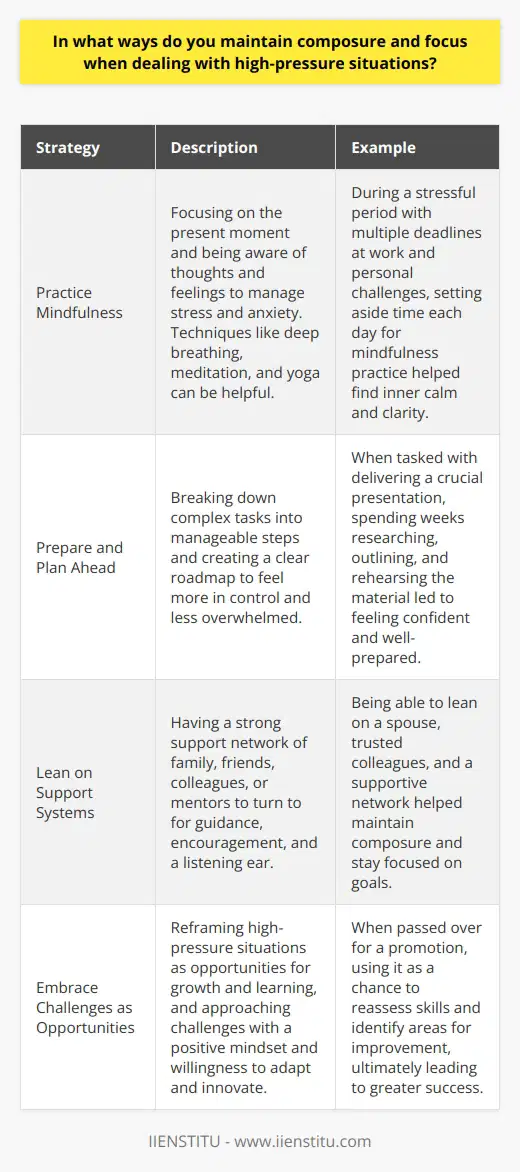
What are some common sample stress interview questions?
Stress interviews are designed to test a candidate's ability to handle pressure and think on their feet. While not all companies conduct stress interviews, it's important to be prepared for the possibility. Here are some common sample stress interview questions that you may encounter:
1. "Why should we hire you?"
This question puts you on the spot and forces you to sell yourself. I remember being caught off guard by this question in my first interview. I learned to highlight my unique skills and experiences that make me the best fit for the role.
Tips:
Focus on your strengths and accomplishments
Align your skills with the job requirements
Show enthusiasm and confidence
2. "What are your weaknesses?"
Interviewers ask this question to see how self-aware and honest you are. It's tempting to give a cliché answer like "I work too hard," but that can backfire. In my experience, it's best to be genuine and show how you're working to improve.
Tips:
Choose a real weakness, but not a critical one
Explain how you're addressing the weakness
Show a commitment to personal growth
3. "Tell me about a time you failed."
This question is designed to see how you handle adversity and learn from your mistakes. It can be uncomfortable to talk about failures, but it's an opportunity to show your resilience. I once had to discuss a project that went over budget, but I focused on the valuable lessons I learned.
Tips:
Choose a specific example
Take responsibility for your role in the failure
Emphasize what you learned and how you've grown
4. "How do you handle stress and pressure?"
Interviewers want to know if you can stay calm and productive under pressure. I find that the key is to have a toolbox of stress-management techniques. For me, that includes deep breathing, prioritizing tasks, and asking for help when needed.
Tips:
Give specific examples of how you've handled stress in the past
Highlight your time management and problem-solving skills
Show that you're proactive about managing stress
Remember, the goal of a stress interview is not to make you crack under pressure. It's to see how you think on your feet and handle challenging situations. By preparing for these common questions and staying true to yourself, you can ace even the toughest stress interview.
In conclusion, while stress interviews can be intimidating, they're also an opportunity to showcase your strengths and resilience. By anticipating common questions, drawing on your own experiences, and staying calm under pressure, you can demonstrate that you're the right candidate for the job.
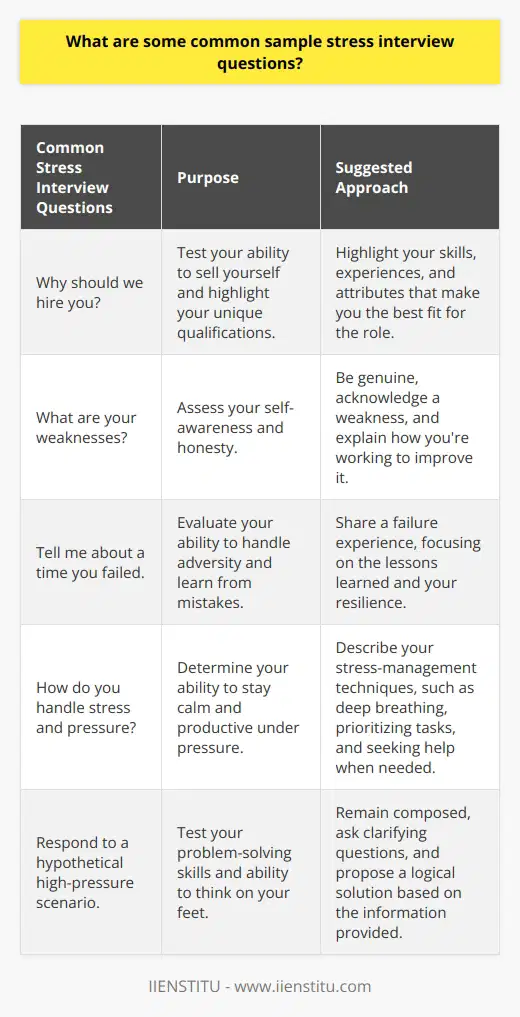
How can I effectively answer sample stress interview questions?
Answering sample stress interview questions effectively requires preparation, self-awareness, and the ability to remain calm under pressure. To excel in these challenging situations, it's essential to understand the purpose behind stress interviews and develop strategies to showcase your problem-solving skills and resilience.
Understand the Purpose of Stress Interviews
Stress interviews are designed to assess how well you handle high-pressure situations and unexpected challenges. Employers use these questions to evaluate your ability to think on your feet, maintain composure, and find solutions to complex problems. By understanding the intent behind these interviews, you can approach them with a positive mindset and demonstrate your adaptability.
Research Common Stress Interview Questions
To prepare for a stress interview, familiarize yourself with common questions and scenarios. These may include brainteasers, hypothetical situations, or confrontational queries. I once faced a question where I was asked to sell a pen to the interviewer. It caught me off guard, but I took a moment to gather my thoughts and focused on highlighting the unique features and benefits of the pen.
Practice Your Responses
Once you have a list of potential stress interview questions, practice your responses. Role-play with a friend or family member to simulate the pressure of an actual interview. This will help you develop confidence and refine your answers. Remember to stay focused on the question at hand and avoid getting flustered or defensive.
Showcase Your Problem-Solving Skills
Stress interviews often present complex problems or scenarios that require creative thinking. Use these opportunities to showcase your problem-solving abilities. Break down the issue into smaller components, analyze the situation from different angles, and propose well-thought-out solutions. Demonstrating your analytical skills and ability to think critically under pressure will impress the interviewer.
Maintain a Positive Attitude
Throughout the stress interview, maintain a positive and professional demeanor. Avoid getting discouraged or frustrated by challenging questions. Instead, view them as opportunities to showcase your resilience and adaptability. Smile, make eye contact, and communicate with confidence. Your attitude and body language play a significant role in how you are perceived by the interviewer.
Provide Examples and Personal Experiences
When answering stress interview questions, support your responses with relevant examples and personal experiences. Share instances where you successfully handled high-pressure situations or overcame obstacles. This adds credibility to your answers and demonstrates your ability to apply your skills in real-life scenarios. I remember a time when a project deadline was unexpectedly moved up, and I had to rally my team to complete the work efficiently. By sharing this experience, I showcased my leadership and problem-solving abilities.
In conclusion, effectively answering sample stress interview questions requires a combination of preparation, self-awareness, and the ability to remain composed under pressure. By understanding the purpose of these interviews, practicing your responses, showcasing your problem-solving skills, maintaining a positive attitude, and providing relevant examples, you can successfully navigate the challenges of a stress interview and leave a lasting impression on the interviewer.
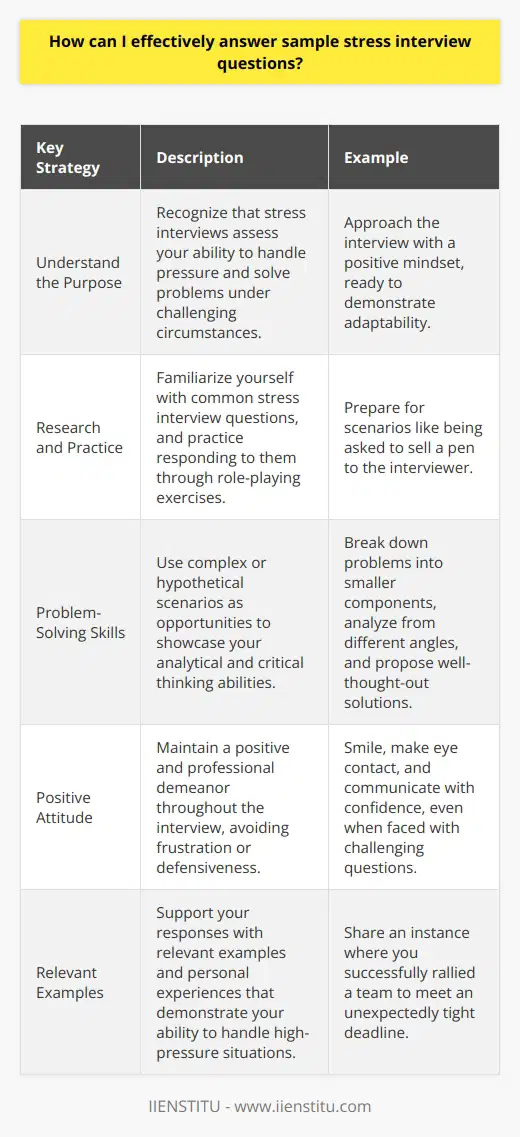
What strategies can I use to prepare for sample stress interview questions?
Preparing for sample stress interview questions requires a combination of mental preparation, research, and practice. By understanding the purpose behind these questions and developing strategies to handle them calmly and thoughtfully, you can showcase your ability to perform under pressure.
Understand the Purpose of Stress Questions
Stress interview questions are designed to assess how you react in challenging situations. Employers want to see if you can remain composed, think critically, and provide coherent responses even when faced with unexpected or uncomfortable scenarios. Recognizing this purpose can help you approach these questions with the right mindset.
I remember my first encounter with a stress question during an interview. The interviewer asked me how I would handle a situation where a client was extremely dissatisfied with my work. Initially, I felt a surge of anxiety, but then I realized that the interviewer was more interested in my thought process and problem-solving skills than the specific answer itself. This realization helped me stay focused and provide a well-reasoned response.
Research Common Stress Questions
Familiarize yourself with typical stress interview questions. Look for resources online, such as career websites or interview guides, that provide examples of these questions. Some common themes include handling conflict, dealing with failure, making difficult decisions, and responding to criticism. By knowing what to expect, you can feel more prepared and less caught off guard during the actual interview.
Practice Your Responses
Once you have a list of potential stress questions, practice answering them out loud. This will help you get comfortable with articulating your thoughts and responding coherently under pressure. Focus on structuring your answers in a clear and concise manner, using specific examples to illustrate your points.
When I was preparing for my last interview, I spent several hours practicing stress questions with a friend. We took turns role-playing as the interviewer and the candidate. This experience was invaluable because it allowed me to refine my responses and gain confidence in my ability to handle these types of questions.
Stay Calm and Composed
During the actual interview, it's crucial to maintain a calm and composed demeanor. Take a deep breath before answering each question, and don't be afraid to take a moment to collect your thoughts. Speak slowly and clearly, and avoid getting defensive or confrontational.
I find that practicing mindfulness techniques, such as focusing on my breath or mentally counting to five, helps me stay grounded in stressful situations. By remaining calm and collected, you demonstrate your ability to handle pressure with professionalism and poise.
Provide Specific Examples
When answering stress questions, try to provide specific examples from your past experiences. This could be a time when you successfully navigated a challenging situation at work or in your personal life. Using concrete examples makes your responses more believable and memorable.
Focus on Problem-Solving
Stress questions often present hypothetical problems or challenges. When answering these questions, focus on your problem-solving approach rather than getting bogged down in the details of the scenario. Explain how you would assess the situation, gather information, consider different perspectives, and ultimately make a decision.
By emphasizing your critical thinking and decision-making skills, you show the interviewer that you can handle complex situations with maturity and professionalism.
Remember, the key to success in a stress interview is preparation, practice, and a positive attitude. By understanding the purpose behind these questions, researching common themes, practicing your responses, staying composed, providing specific examples, and focusing on problem-solving, you can demonstrate your resilience and ability to excel under pressure.
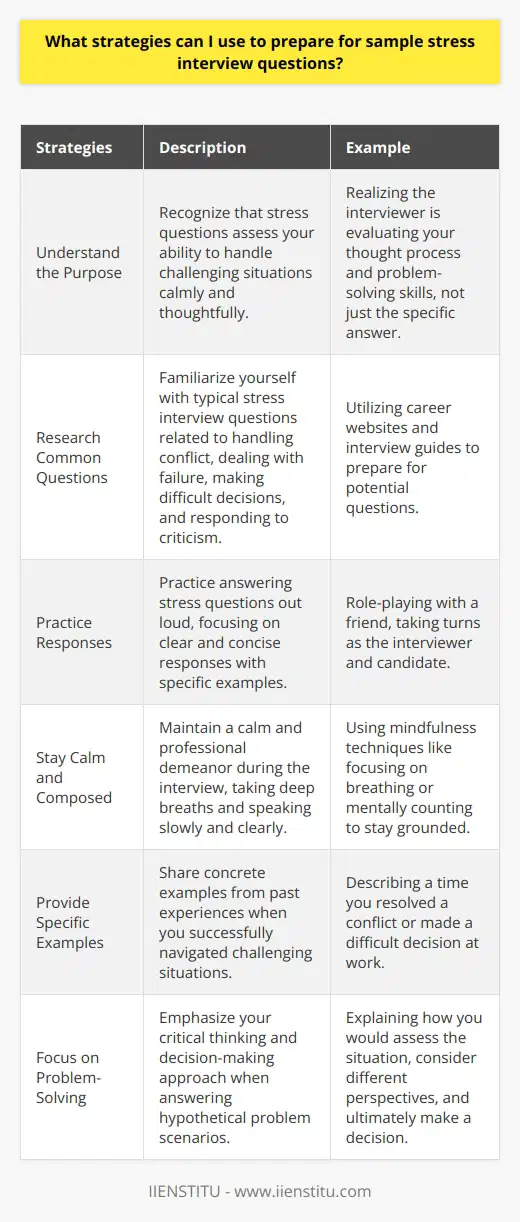
How do you manage stress and pressure in your professional life?
Managing stress and pressure in professional life is a crucial skill that can greatly impact one's overall well-being and productivity. There are several strategies that individuals can employ to effectively cope with the demands of their work environment.
Prioritizing Self-Care
One of the most important aspects of managing stress is prioritizing self-care. This includes engaging in regular physical exercise, maintaining a balanced diet, and getting sufficient sleep. Exercise has been shown to release endorphins, which are natural mood-boosters that can help alleviate stress. Personally, I find that going for a brisk walk during my lunch break helps me clear my mind and recharge for the rest of the day.
Additionally, it's essential to set aside time for hobbies and activities that bring joy and relaxation. For me, playing the guitar and painting have been incredibly therapeutic outlets that allow me to disconnect from work-related stressors.
Effective Time Management
Another key strategy for managing stress and pressure is effective time management. This involves prioritizing tasks, setting realistic deadlines, and breaking larger projects into smaller, more manageable steps. By creating a clear plan and schedule, individuals can avoid feeling overwhelmed by their workload.
I've found that using a digital planner and setting reminders for important tasks has greatly improved my ability to stay organized and on top of my responsibilities. It's also crucial to learn to say no to non-essential tasks or requests that can contribute to unnecessary stress.
Establishing Boundaries
Establishing clear boundaries between work and personal life is another important aspect of managing stress. This means setting aside dedicated time for work and ensuring that personal time is respected. It's easy to fall into the trap of constantly checking emails or taking work calls outside of office hours, but this can quickly lead to burnout.
I make a conscious effort to disconnect from work-related devices and notifications during my personal time, allowing me to fully engage in my hobbies and spend quality time with loved ones.
Seeking Support
Finally, it's essential to recognize when stress and pressure become overwhelming and to seek support when needed. This can include reaching out to colleagues, supervisors, or mentors for guidance and assistance. Many workplaces also offer employee assistance programs that provide confidential counseling and resources for managing stress.
In my own experience, I've found that opening up to trusted coworkers about my struggles has helped me feel less alone and has often led to valuable advice and support.
Conclusion
Managing stress and pressure in professional life requires a multi-faceted approach that includes prioritizing self-care, effective time management, establishing boundaries, and seeking support when needed. By implementing these strategies and finding what works best for them, individuals can cultivate greater resilience and thrive in their careers.
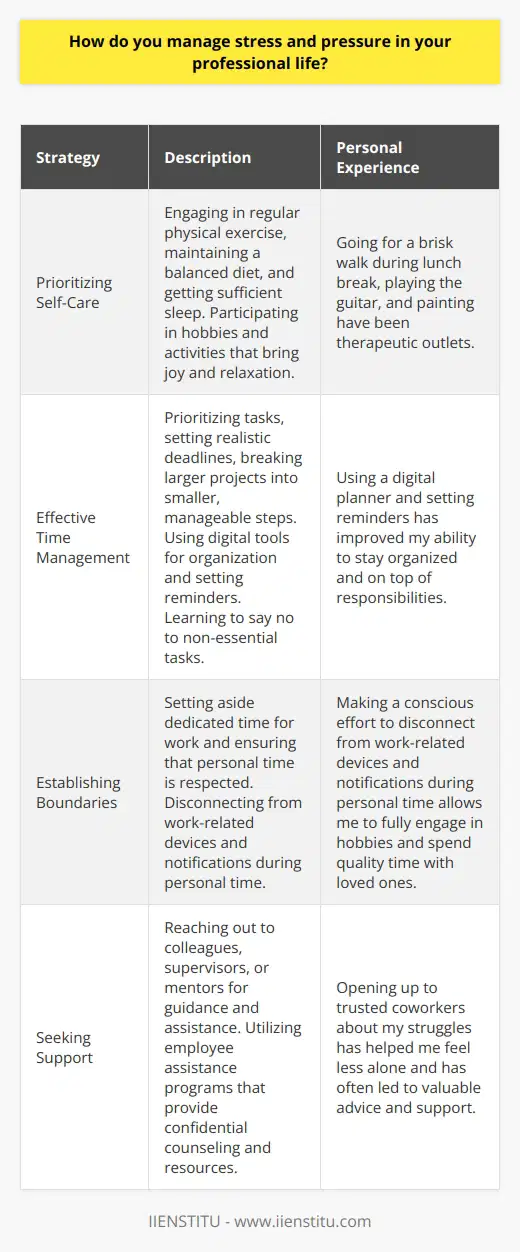
What strategies do you employ to cope with stress and pressure at work?
As a professional, I have developed several strategies to effectively manage stress and pressure in the workplace. One of the most important techniques I employ is prioritizing my tasks and focusing on the most critical ones first. By creating a clear list of priorities, I can ensure that I am making the most efficient use of my time and energy.
Effective Time Management
Another key strategy is effective time management. I break down larger projects into smaller, more manageable tasks and set realistic deadlines for each one. This approach helps me avoid feeling overwhelmed and allows me to make steady progress toward my goals. Additionally, I make sure to take regular breaks throughout the day to recharge and maintain my focus.
Maintaining a Healthy Work-Life Balance
Maintaining a healthy work-life balance is also crucial for managing stress. I make a conscious effort to disconnect from work when I am not in the office, whether that means engaging in hobbies, spending time with loved ones, or simply relaxing. By setting clear boundaries between my personal and professional life, I can prevent work-related stress from spilling over into other areas of my life.
Seeking Support from Colleagues and Supervisors
When I am feeling particularly stressed or overwhelmed, I am not afraid to seek support from my colleagues and supervisors. I have found that discussing my concerns with others can help me gain new perspectives and find solutions to challenging problems. Moreover, knowing that I have a support system at work can provide a sense of reassurance and reduce my overall stress levels.
Practicing Mindfulness and Relaxation Techniques
Finally, I have found that practicing mindfulness and relaxation techniques can be incredibly helpful for managing stress. Whether it is through deep breathing exercises, meditation, or simply taking a few moments to center myself, these practices help me stay grounded and focused, even in the face of high-pressure situations.
In conclusion, managing stress and pressure at work requires a multifaceted approach that involves prioritizing tasks, managing time effectively, maintaining a healthy work-life balance, seeking support when needed, and practicing mindfulness and relaxation techniques. By employing these strategies consistently, I have been able to successfully navigate even the most challenging and stressful periods in my career.
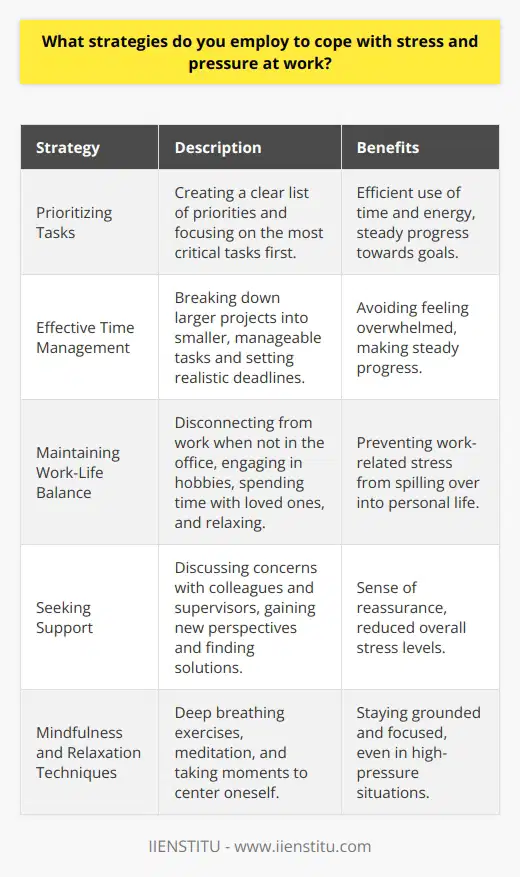
In what ways do you deal with stressful situations and pressure in your job?
Dealing with stressful situations and pressure in the workplace is a common challenge that many individuals face. Over the years, I have developed several strategies that help me cope with stress and maintain my productivity. One of the most effective methods I have found is to prioritize my tasks and break them down into smaller, manageable steps. By focusing on one task at a time and setting realistic goals, I am able to reduce my anxiety and feel more in control of my workload.
The Power of Deep Breathing and Meditation
Another technique that I have found to be incredibly helpful is deep breathing and meditation. Whenever I feel overwhelmed or stressed, I take a few minutes to close my eyes and focus on my breath. I inhale deeply through my nose, hold it for a few seconds, and then exhale slowly through my mouth. This simple act of mindfulness helps me to calm my mind and body, allowing me to approach my work with a clearer and more focused perspective.
The Importance of Self-Care and Work-Life Balance
In addition to these strategies, I also make sure to prioritize self-care and maintain a healthy work-life balance. I have learned that taking regular breaks throughout the day, even if just for a few minutes, can make a significant difference in my stress levels and overall well-being. Whether it's going for a quick walk outside, stretching at my desk, or chatting with a colleague, these small moments of respite help me to recharge and refocus.
Moreover, I have found that setting boundaries between my work and personal life is crucial for managing stress. When I leave the office, I make a conscious effort to disconnect from work-related tasks and emails, allowing myself to fully engage in my personal life and hobbies. This helps me to maintain a sense of balance and perspective, which in turn makes me more resilient and better equipped to handle the challenges of my job.
Seeking Support and Communicating with Colleagues
Finally, I have learned the value of seeking support and communicating openly with my colleagues and supervisors. When I am feeling particularly stressed or overwhelmed, I reach out to my team members for help and guidance. By sharing my concerns and collaborating with others, I am often able to find creative solutions and alleviate some of the pressure I am feeling.
Conclusion
In conclusion, dealing with stressful situations and pressure in the workplace is an ongoing process that requires a combination of strategies and self-awareness. By prioritizing tasks, practicing mindfulness, maintaining a healthy work-life balance, and seeking support when needed, I have been able to navigate the challenges of my job with greater ease and resilience. While stress is an inevitable part of any career, I have found that by taking proactive steps to manage it, I am able to not only survive but thrive in my professional life.
